The Vydehi Institute of Cardiac Sciences is a well-equipped super-speciality centre at VIMS designed to serve your heart’s needs. We have separate departments for conducting Cardiac and Cardiothoracic & Vascular Surgeries. The extensive services include adult cardiac surgery, adult and paediatric valve repairs and replacements, and intensive coronary care unit (ICCU).
The departments are equipped with state-of-the-art equipment headed by highly experienced specialists to treat all cardiac and cardiothoracic & vascular cases. The internationally used Homograft and Xenograft facilities break barriers with their ground-breaking research in angiogenesis, endothelium–coated grafts, pericardial patches, and other operative procedures.
The department has a high nurse-to-patient ratio allowing for proper post-operative care. In addition, there are anaesthetists, intensive care specialists, and critical care nurses giving focussed attention to the patient in the Critical Care unit. All these factors have resulted in a 100% success rate for the surgeries conducted at the departments.
The Vydehi Institute of Cardiac Sciences commits itself to provide affordable healthcare to the less privileged sections of society. We also provide free healthcare to the truly poor. Reach out to us to know how you can benefit from our services and live a hearty life.
The Vydehi Institute of Cardiac Sciences has the best Cardiologists working in the department.
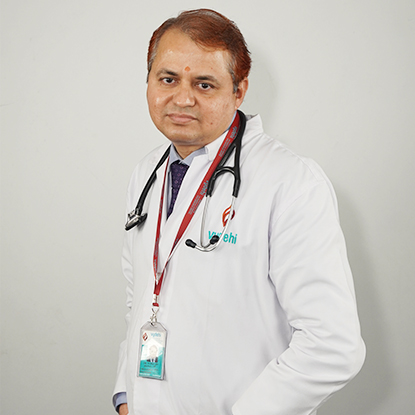

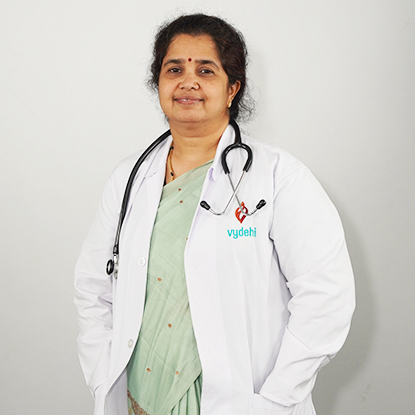
MBBS,MD, DM
Karnataka State Medical
Council Registration Number
46275


Senior Resident
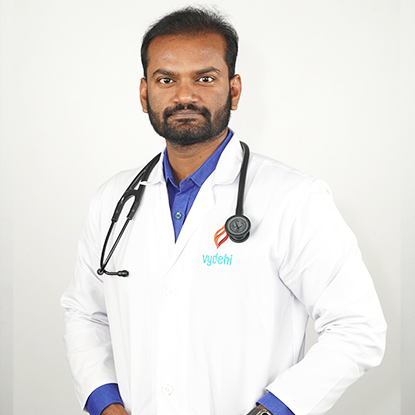
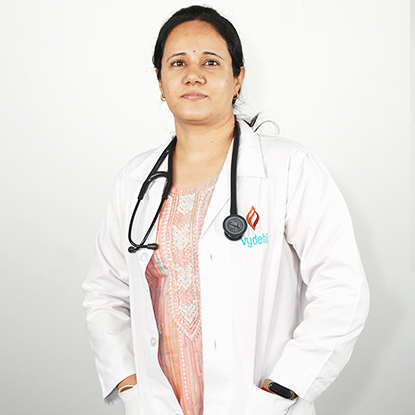
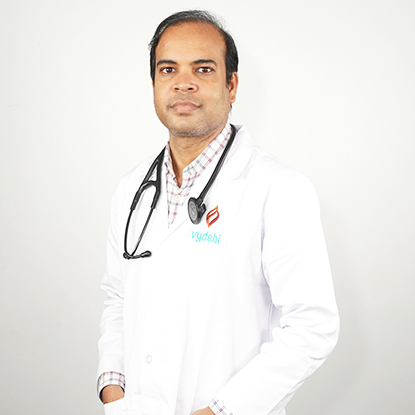

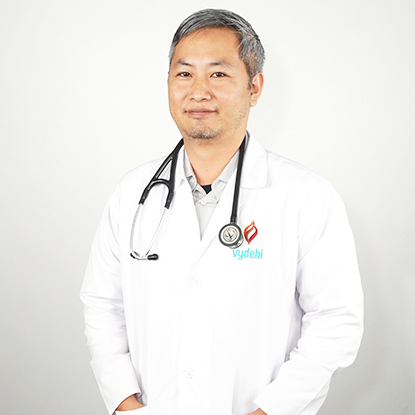
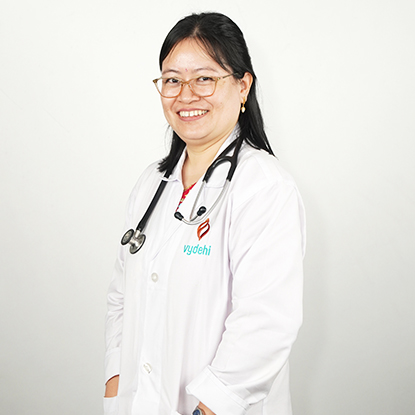
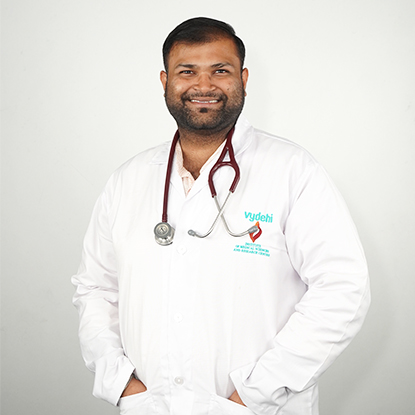
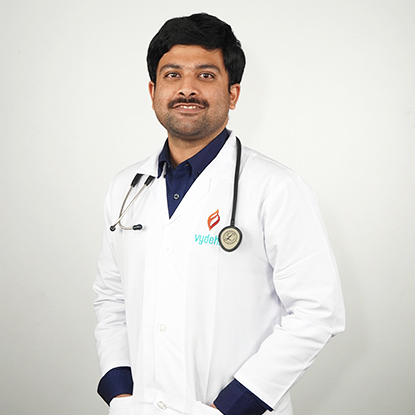
A complete Cardiac evaluation and treatment determines whether your heart is in perfect working condition and whether it needs any preventive treatment or permanent treatment. Based on these reports, further surgical procedures are determined.
Cardiac Catheterization is the process in which a catheter (a tiny tube) is inserted into the vessel of the heart to examine blood flow and to see how well the heart is pumping. It can also be used to check on pressure, blood flow, collect blood samples, examine arteries and more.
Angioplasty is the process of widening or unblocking an artery by inserting tiny uninflated balloons into it and then inflating the balloons. The balloons are removed after inflation.
Coronary angiography is the procedure of taking an X-ray of the heart . This is done by inserting a catheter into the arteries or the chamber of the heart that needs to be X-rayed followed by a contrast medium or dye which is visible in X-ray. The X-ray pictures are called angiograms.
Coronary Angioplasty is the procedure done to treat the narrow (stetonic) coronary arteries of the heart which occur due to the formation of cholesterol laden plates in the artery.
A Balloon Valve Plasty is a surgical procedure to repair valves of the heart using a balloon.
Pacemaker Implantation is a minimally invasive surgical procedure in which an incision is made in the collar bone. A pocket is made in the tissue over the muscle and pocket in the collar bone in which the pace maker is held. Leads from the pacemaker in the pocket are led through the vein in the side of the pocket and are led to the heart.
Peripheral angioplasty is the clearing of or opening up of blood vessels apart from coronary arteries. This is done using an uninflated balloon. This procedure is used to widen arteries that supply blood to the legs and below.
Renal Angioplasty is the procedure done to remove blockage of the renal artery, the artery that supplies the kidney with blood. After the procedure is over, a stent is inserted into the artery to keep it open.
Coronary Artery Stenting is the process of inserting a stent in the coronary artery after clearing the artery so that the artery doesn’t collapse and get blocked again. Vydehi does this using biodegradable stents as opposed to usual metal stents.
This procedure is done when one of a septum of the heart is ruptured. To repair the septum, a device is planted the ruptured area.
Permanent Pacemaker Implementation involves placing the pacemaker in the upper part of the chest. The lead to heart from the pacemaker is lead through a vein. The generator is attached to these leads.
Catherization Studies for Congenital Heart Disease is when catheterization is done children to confirm the need for further operation on their heart and an angiogram is taken.
(Off Pump Coronary Bypass (OPCAB) & Cardio Pulmonary Bypass (CPB)
Coronary Artery Bypass Grafting is a surgical procedure to bypass Coronary Artery by grafting an artery or vein from another part of the body to bypass a blocked coronary artery thus improving blood supply to the heart muscle.
Valvular Heart Disease is the procedure to correct valve stenosis (narrowing of the hearts valves) or valvular regurgitation (when the flows back into the valve). Depending on the severity of the disease, treatment is prescribed. If necessary, the valve is replaced by a mechanical or bio-prosthetic valve.
Congenital Paediatric Cardiac Surgery is the correction surgical procedure to treat a child’s heart with defect from birth. This defect can be in the structure or in the great vessels of the heart.
Congenital Adult Cardiac Surgery is the correction surgical procedure to treat an adult’s heart with defect from birth.
Aneurysm Surgery is the surgical procedure to remove an aneurysm which can lead to various other compilations. This is done using an artificial graft.
Beating Heart Surgery for Coronary Artery Disease is a method to surgically rectify Coronary Artery Disease (when plaque builds up in the coronary artery) while the heart is not arrested (stopped and replaced by a heart lung machine) but is still beating.
Lung Surgery is a surgical procedure to remove defecting lobes, cyst formations or parts affecting pneumonia from the lungs.
Neonatal Cardiac Surgery is the treatment of the great vessels and the valves of the hearts of children below one and a half years of age.
Vascular surgeries are surgeries done on the vascular systems (blood vessels) to repair stenosis in them by grafting a mechanical substitute in place of the stenosis.
Paediatric heart surgery involves repairing heart defects for the child’s long-term wellbeing. Depending on the severity of the condition, cardiologists may perform surgery immediately or wait for a few more months or years after birth.
Heart transplantations are performed when the heart ceases to function up to its optimal capacity. The success rate of heart transplantation in adults and children is on par with international standards.
The Vydehi Institute of Cardiac Sciences has the best technology and equipment to dispense quality services to patients. It has
1. A well-equipped non-invasive Lab
2. A 10-bed Cardiac Care Unit (CCU)
3. 2 Cath labs
4. Hill Rom Beds
5. Monitors
6. Defibrillators
7. 2D Echo Machine
8. TMT Machine for Exercise Testing
9. Holter ECG Monitor
The operation theatres are of stainless steel to provide a uniform and hygienic non-corrosive heat resistant surface. The advanced HEPA filters and the laminar flow systems installed at the operation theatre ensure zero bacterial operating environments.
There are separate operation theatres and post-operative care units for adults and children. The department’s post-operative management and rehabilitation centres are unique only at Vydehi as it offers specialized post-operative rehabilitation across all ages – from the children to the aged.
Endocrinology is a rapidly evolving branch of medicine dedicated to the study of hormones and the treatment of related diseases. Endocrinologists focus on diagnosing and managing a wide range of hormonal disorders, making this field one of the most dynamic in modern healthcare.
At VIMS & RC, our Department of Endocrinology is committed to providing comprehensive care for patients with a variety of endocrine and metabolic conditions. Our state-of-the-art facilities ensure the best possible management of advanced diabetic complications, all within an integrated, patient-centered set up. Our team of highly qualified professionals will support you at every stage of your healthcare journey. We specialize in Diabetes Reversal Programs, comprehensive Diabetic Foot Management, and the treatment of endocrine disorders in children and adolescents.
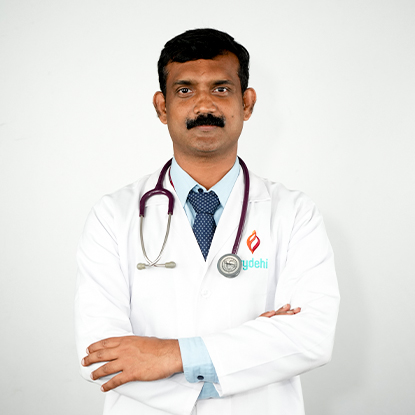
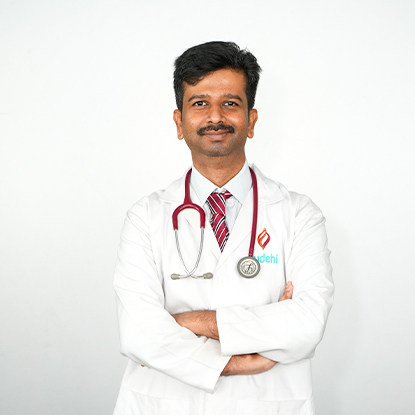
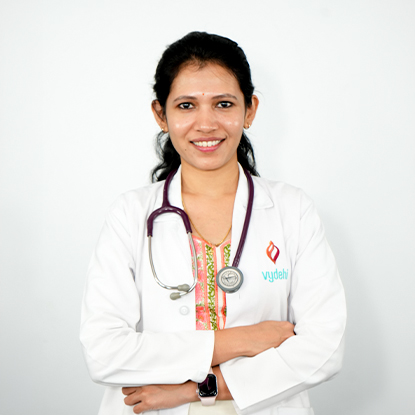
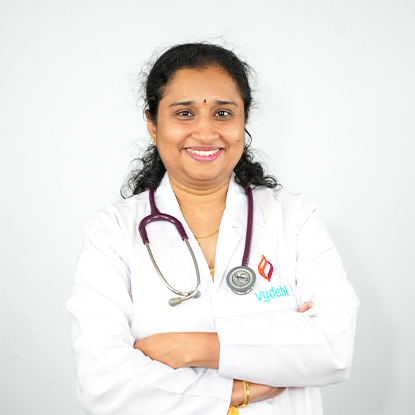

MBBS,MD
Karnataka State Medical
Council Registration Number
1162118




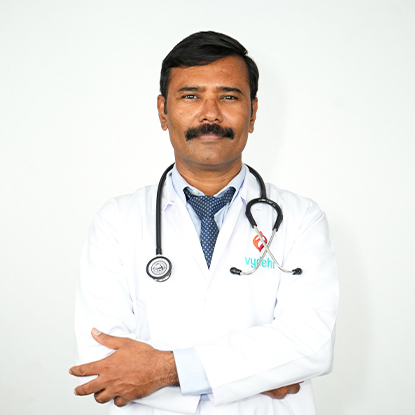
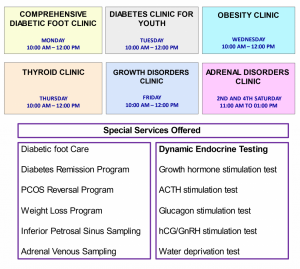
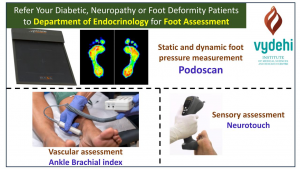
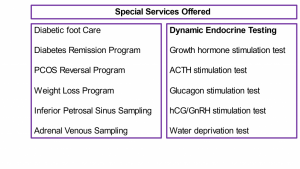


Medical Gastroenterology studies the diseases of Esophagus, Stomach, Small intestine and Large Intestine, Liver, Pancreas and Gall bladder.
At Vydehi hospital, we diagnose and treat the entire range of gastrointestinal diseases and liver diseases. Our expert team of specialists use the state of art advanced equipment like EVIS X1-CV 1500 processor and treatment techniques dealing from simple cases to most critical cases with support from Surgical Gastroenterology, Oncology, Interventional Radiology, Pathology and Intensive Care departments. They carry the examination of the gastrointestinal tract with video endoscopes, which produce a high-quality picture of the internal lining of the gastrointestinal and biliary tract. Most common video endoscopies performed are Oesophago Gastro Duodenoscopy (OGD for short; it is often also called gastroscopy), colonoscopy, Endoscopic Ultrasound (EUS), Endoscopic Retrograde Cholangiopancreatiography (ERCP), SpyGlas Cholangioscopy and Manometry
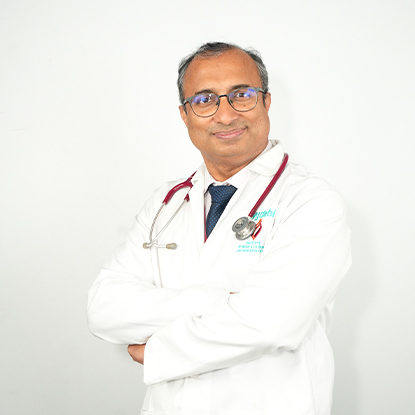
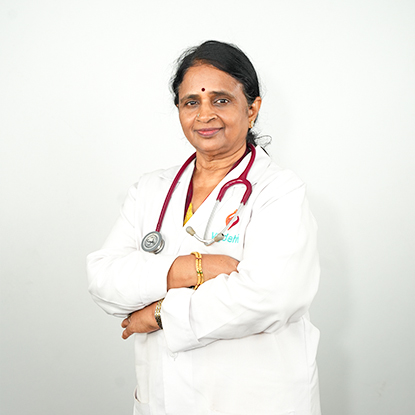
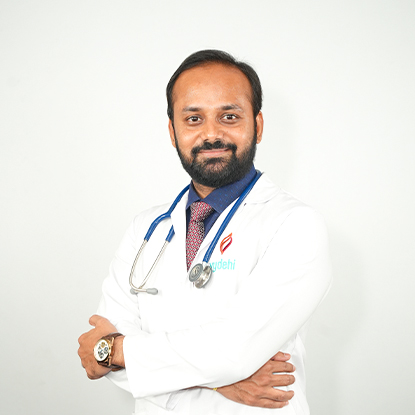
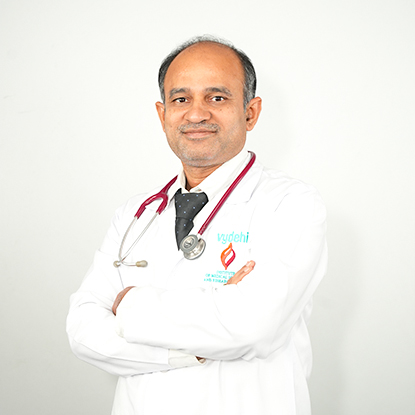

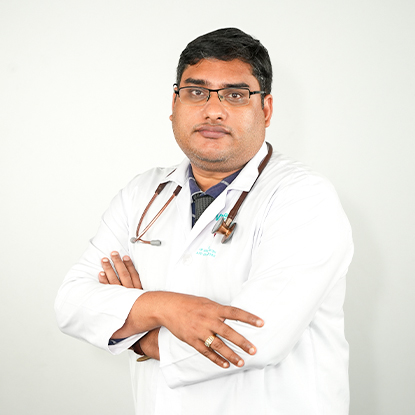
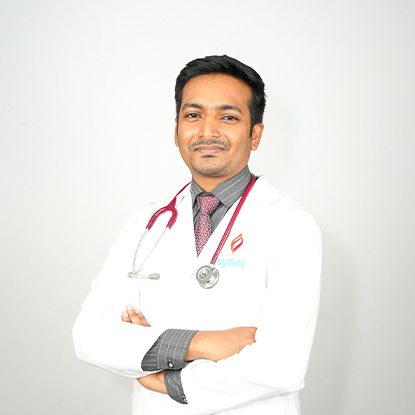
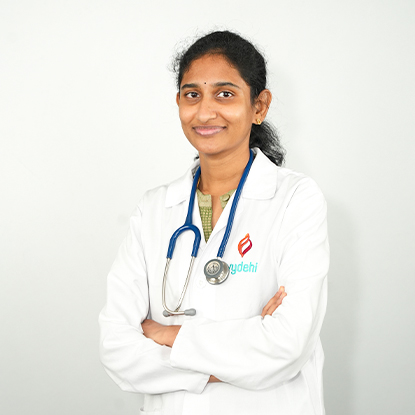
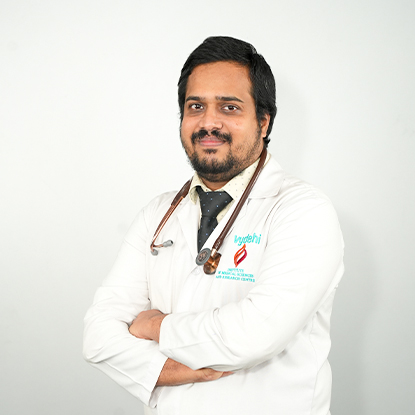
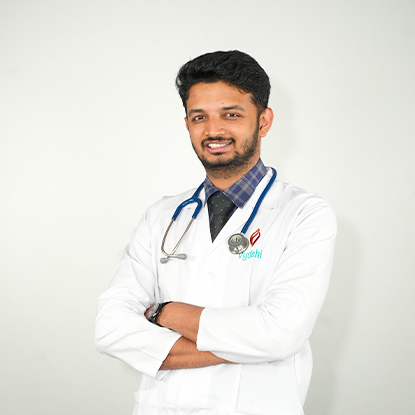

Our services cover the entire range. The eminent services we offer include
Our services cover the entire range Diagnostic and Therapeutic Procedures. The eminent services we offer include
1. Endoscopy Suite Room:
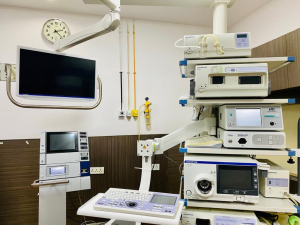
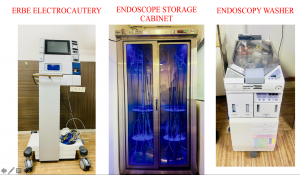
Diagnostic Endoscopy Room: For Endoscopies and Colonoscopies
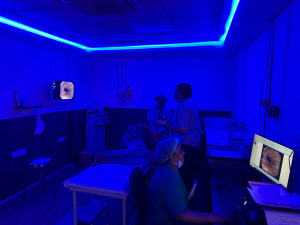
Therapeutic Endoscopy Room (For Advanced Procedures) : Performing POEMS procedure for Achalasia Cardiac
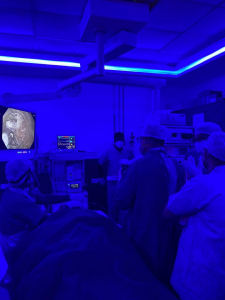
Performing Emergency Bedside Endoscopy in ICU: Active bleeding which was controlled by Hemoclip application
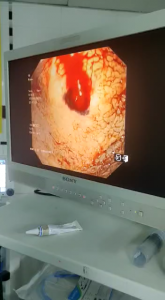
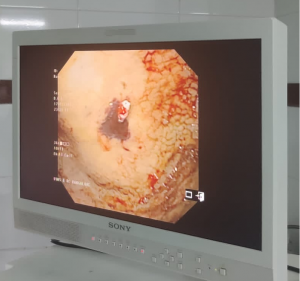
Gastroenterologists see patients with ailments of the pancreas, liver, gallbladder, oesophagus, stomach, small intestine, and colon. Our Speciality clinics and areas of expertise include:
Diseases of the stomach
Diseases of the Small Intestine
Diseases of the Pancreas
Diseases of the Liver and Bile duct
CURRENT PROJECTS – A randomised, double –blind, multicentre phase 3 study in patients with moderately to severely active Ulcerative colitis (UC) to compare the efficacy, safety and immunogenicity of PB016 and Entyvio for the induction and maintainance of clinical response and remission. (UCESIVE)
COMPLETED PROJECTS – A prospective, multicentre, open label, phase IV study to evaluate safety and efficacy profile of Infimab TM in patients with moderate to severe Crohns disease.
VIMS & RC started the department of Nephrology in 2005 with the vision of providing quality services to underprivileged patients at affordable cost. Nephrology is the study of kidneys and disorders associated with them.
Our specialists are well versed and have expertise in treating different kidney disorders. They use evidence-based treatments to offer a multi-disciplinary approach to resolve ailments related to kidneys. The department administers comprehensive nephrology services, including:
We have the following facilities at the dialysis unit.
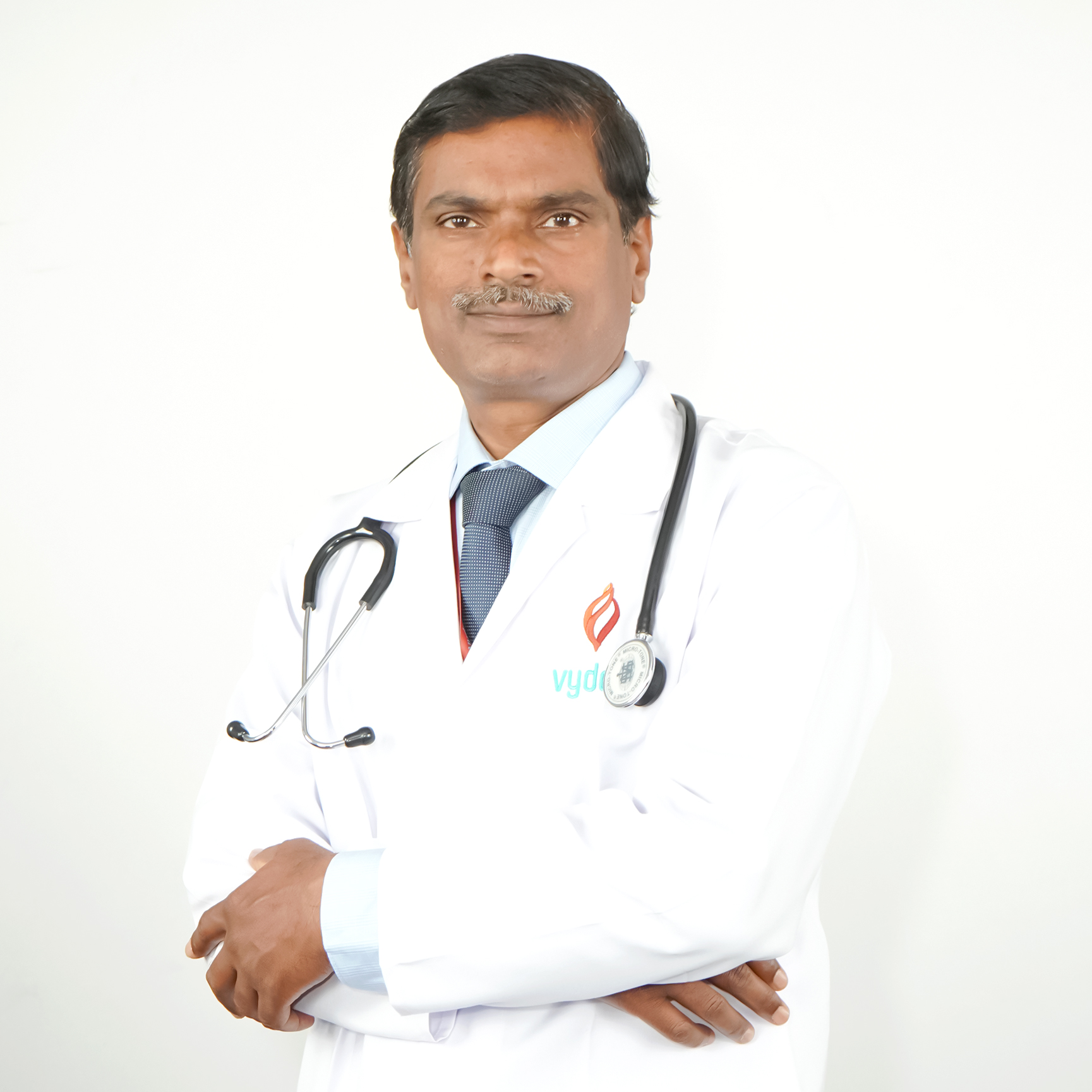
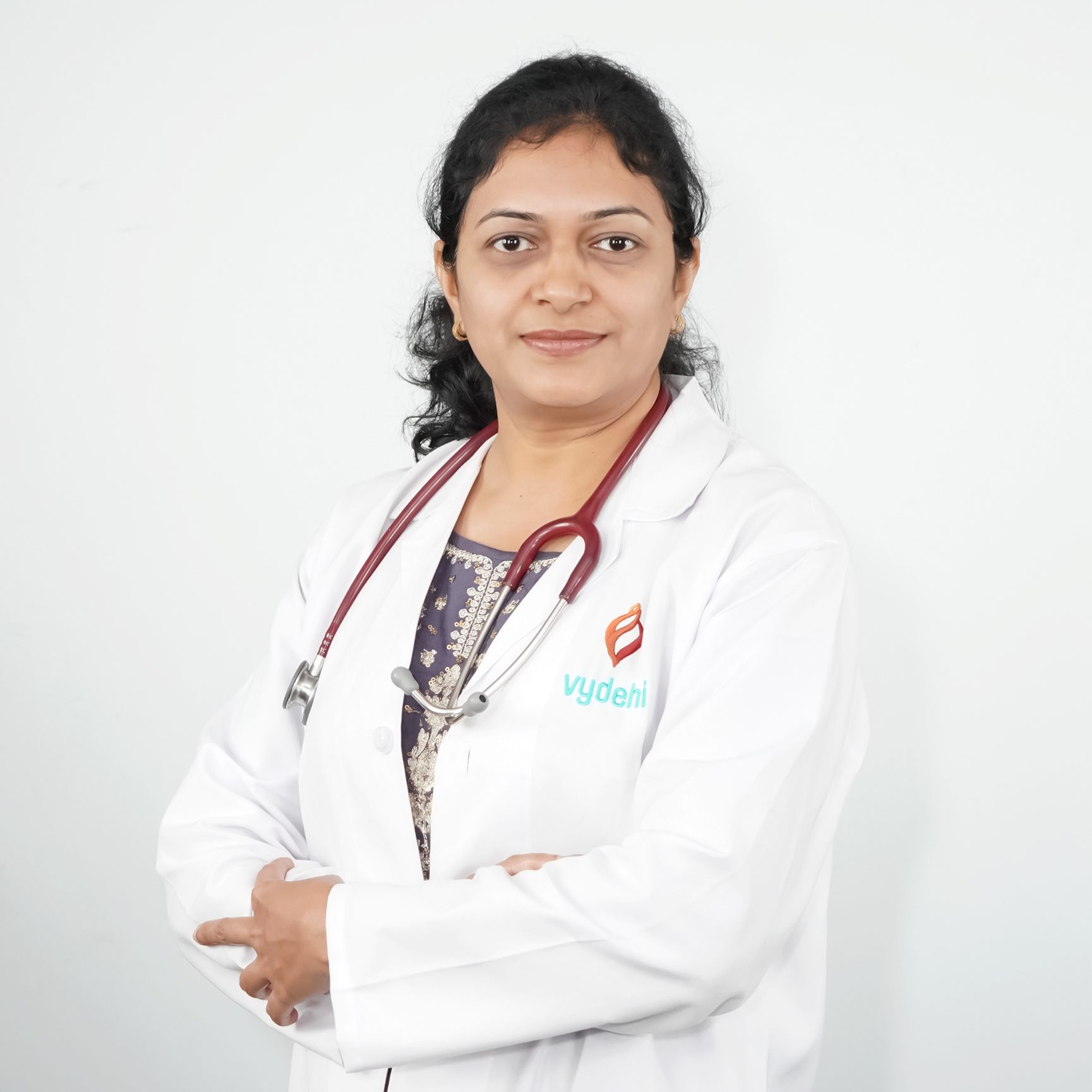
Our team of specialists is adept at handling a broad spectrum of cases related to the kidneys. We customise the treatments after thorough discussions with the specialists and patients to provide complete treatment.
Chronic kidney disease decreases the kidney’s ability to keep you healthy. The two principal causes of chronic kidney disease are Diabetes mellitus and high Blood Pressure. Including the two, several other conditions can harm the kidneys.
Your doctor will investigate if you have any risk factors for chronic kidney disease. These include:
You should visit your doctor and get tested frequently. Your check-up should include:
Most people do not have any severe symptoms until their kidney disease gets worse. However, some of the indications of CKD are:
You should visit your doctor or clinic for regular check-ups and tests for chronic kidney disease. You should also ask your doctor what you can do to lower your chances of developing kidney disease. Your doctor may tell you to:
Most likely, early detection and treatment can often slow or stop chronic kidney disease. How well your treatment can achieve this goal depends on:
Worsening chronic kidney disease can lead to kidney failure. Only two treatments for kidney failure are dialysis or a kidney transplant. These treatments can help you stay healthy and continue your daily activities. Dialysis removes wastes and excess fluid from your blood. Two forms of dialysis are haemodialysis and peritoneal dialysis. A kidney transplant is an operation to place a new kidney in your body to take over the work of your failed kidneys. The kidney may come from someone who has died or a living donor (usually a close relative).
The facilities available at the department of nephrology include:
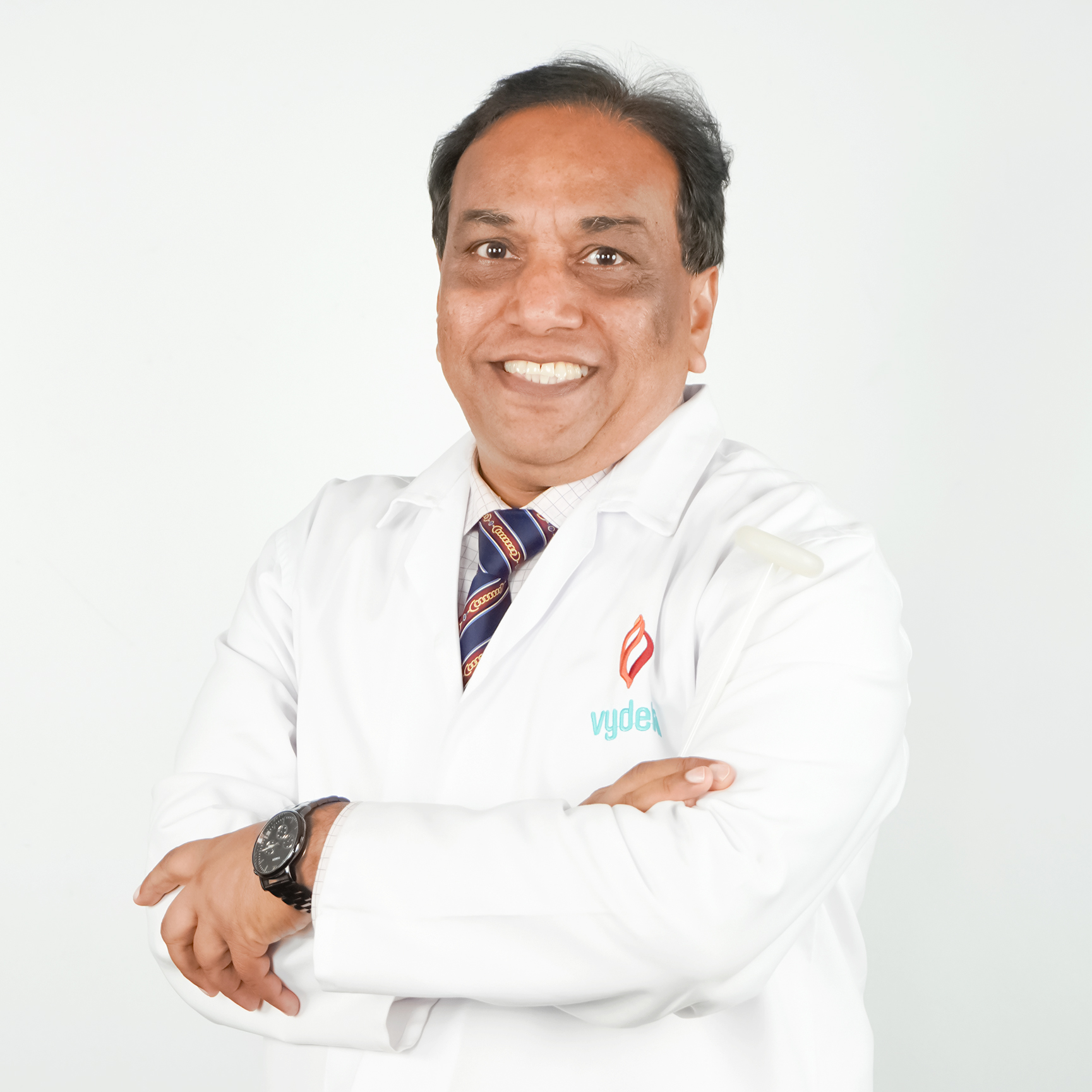
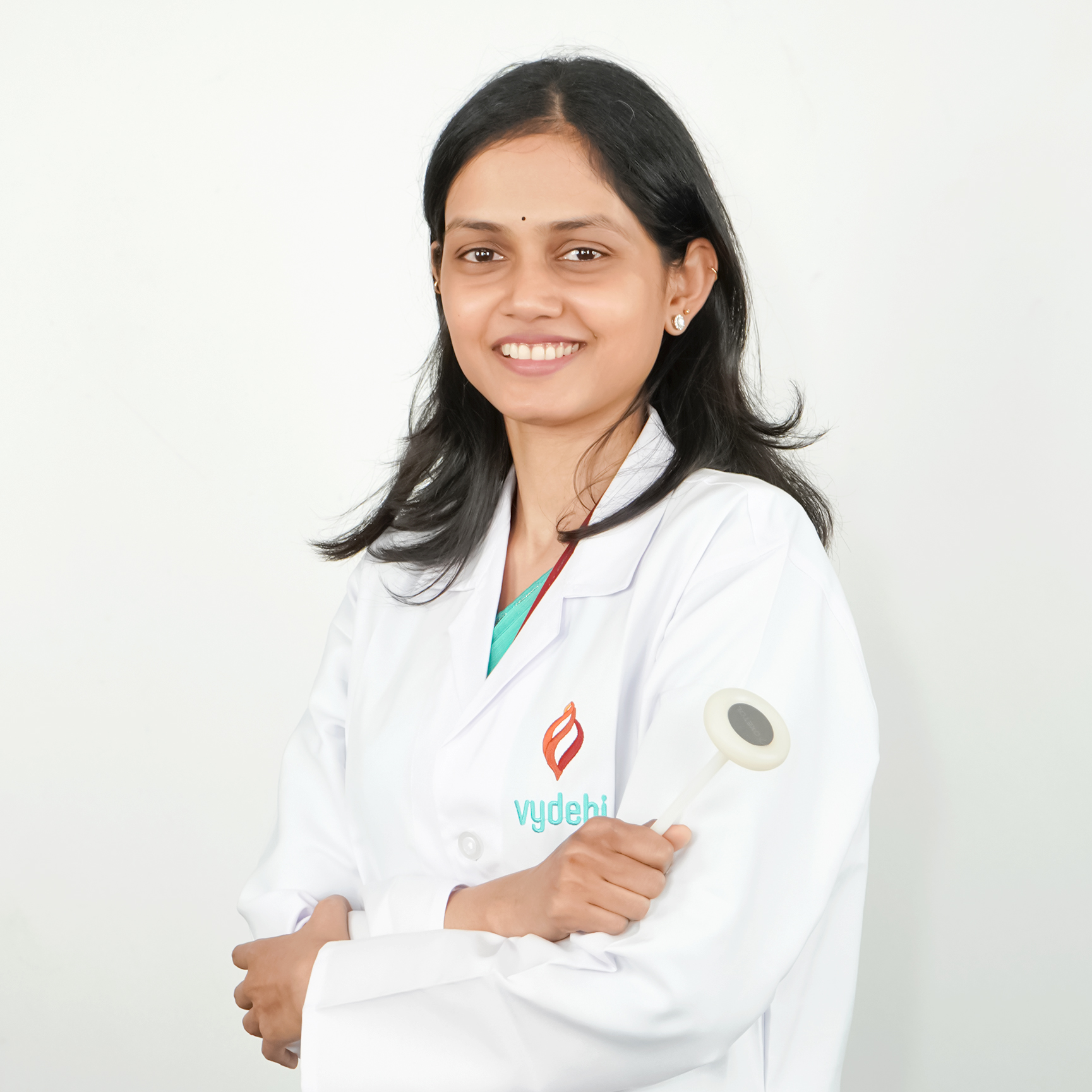
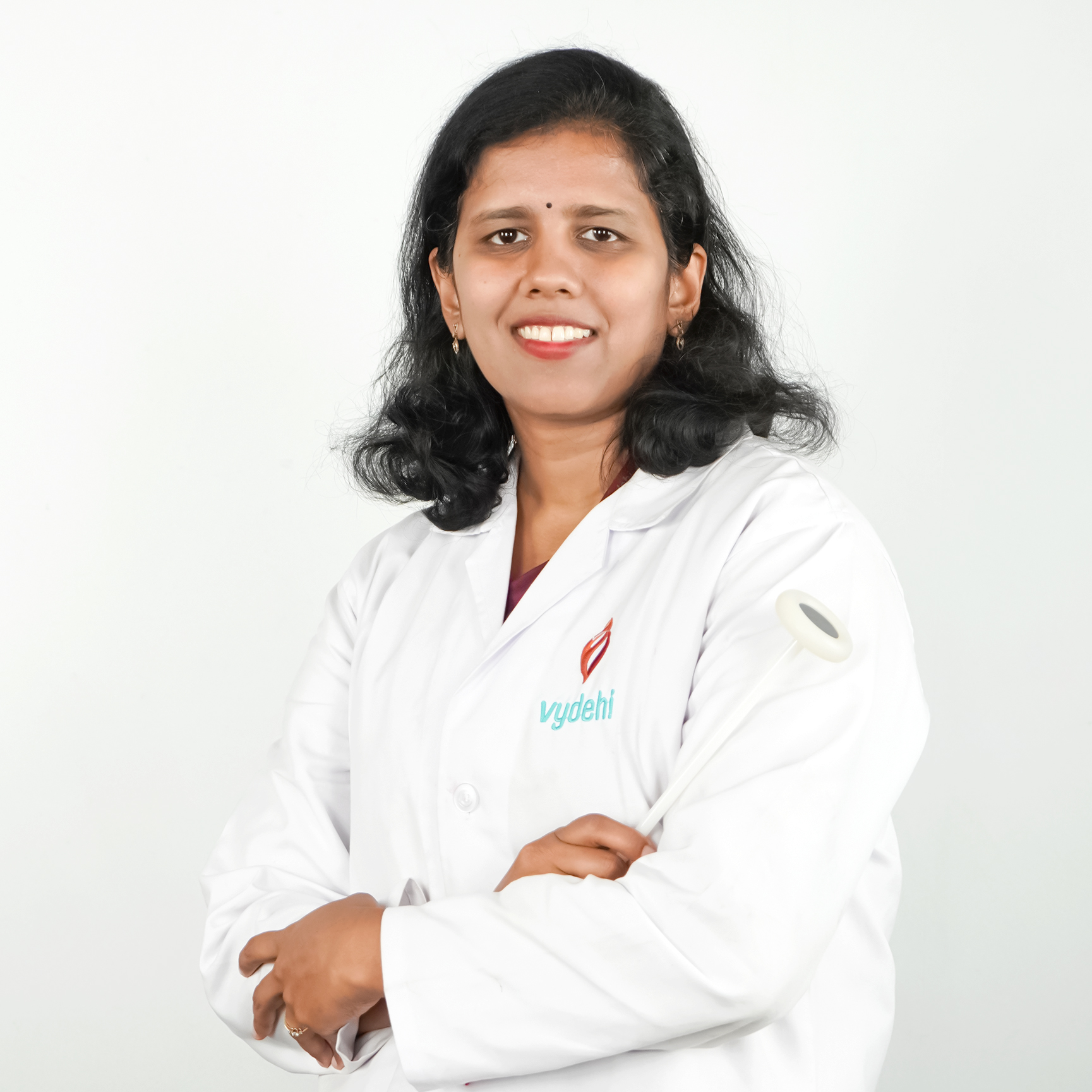

ASSISTANT PROFESSOR
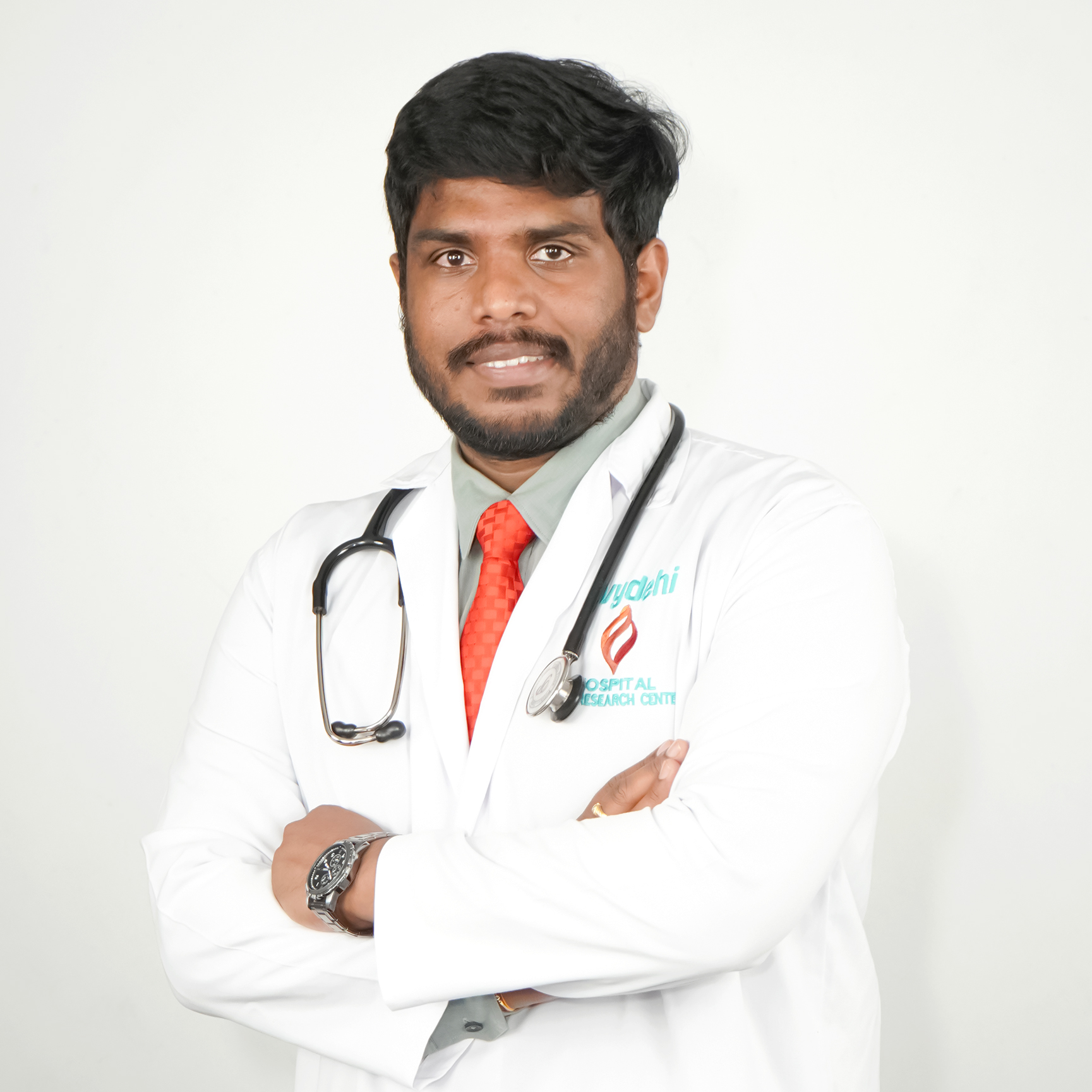
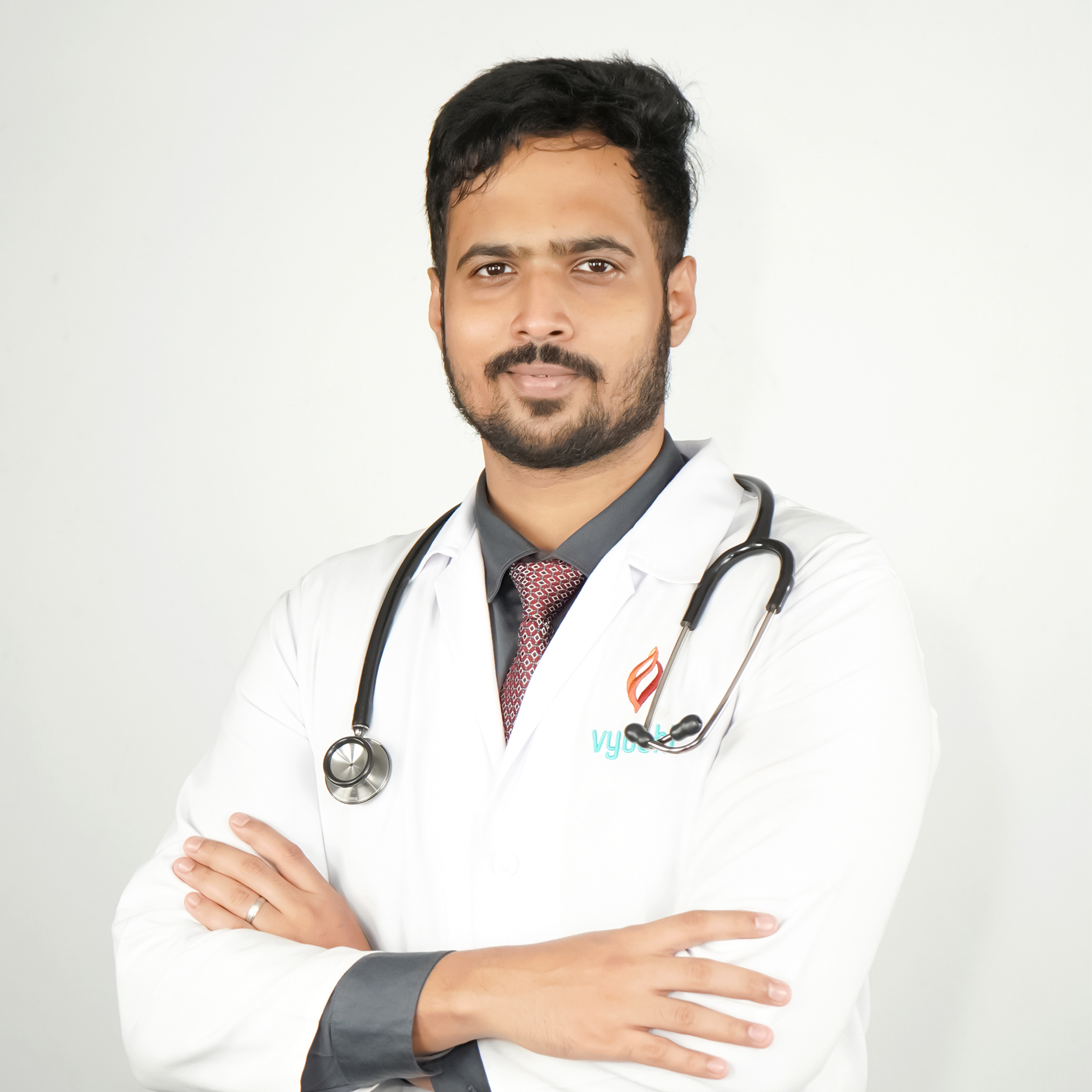

MBBS, MD
Karnataka State Medical
Council Registration Number
158033
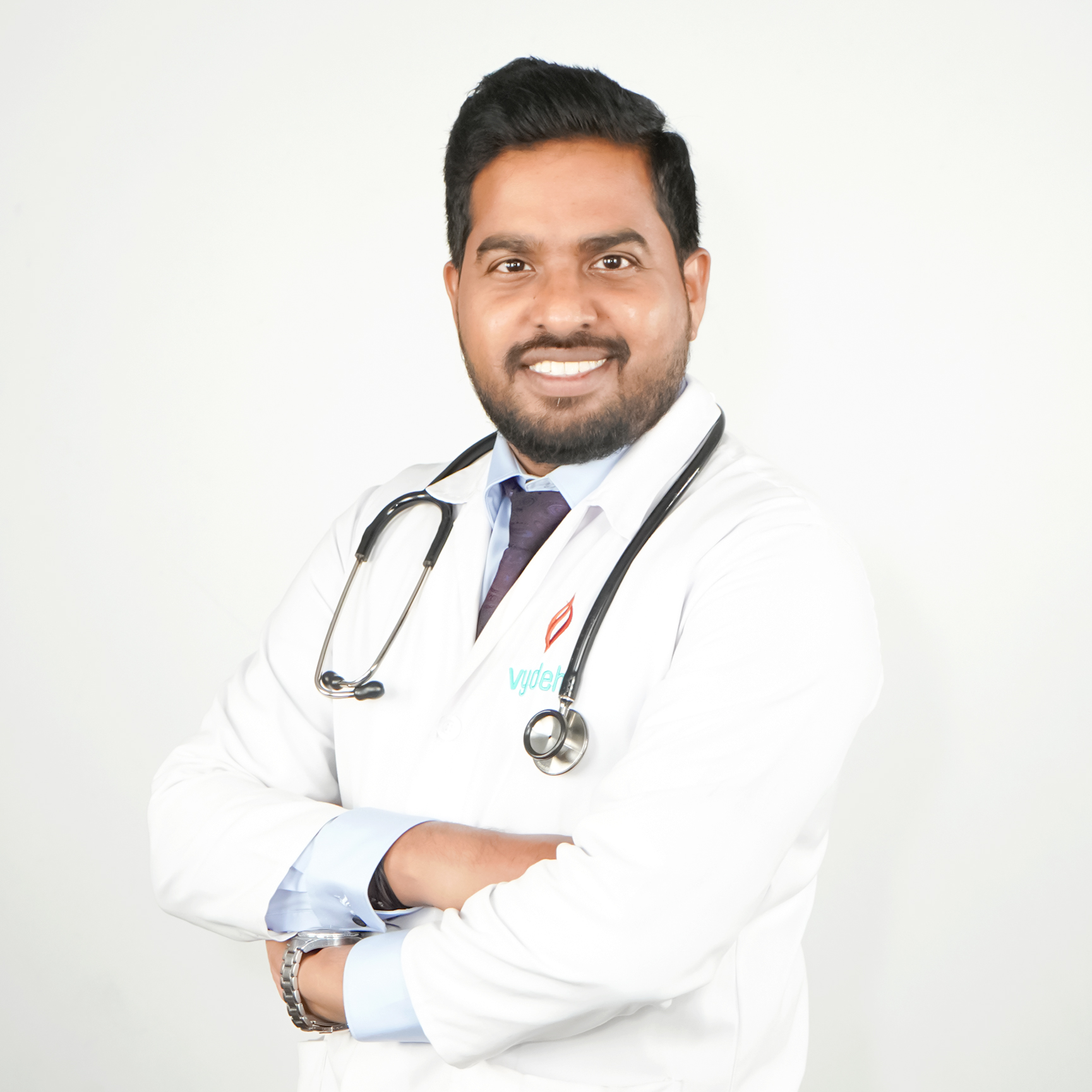
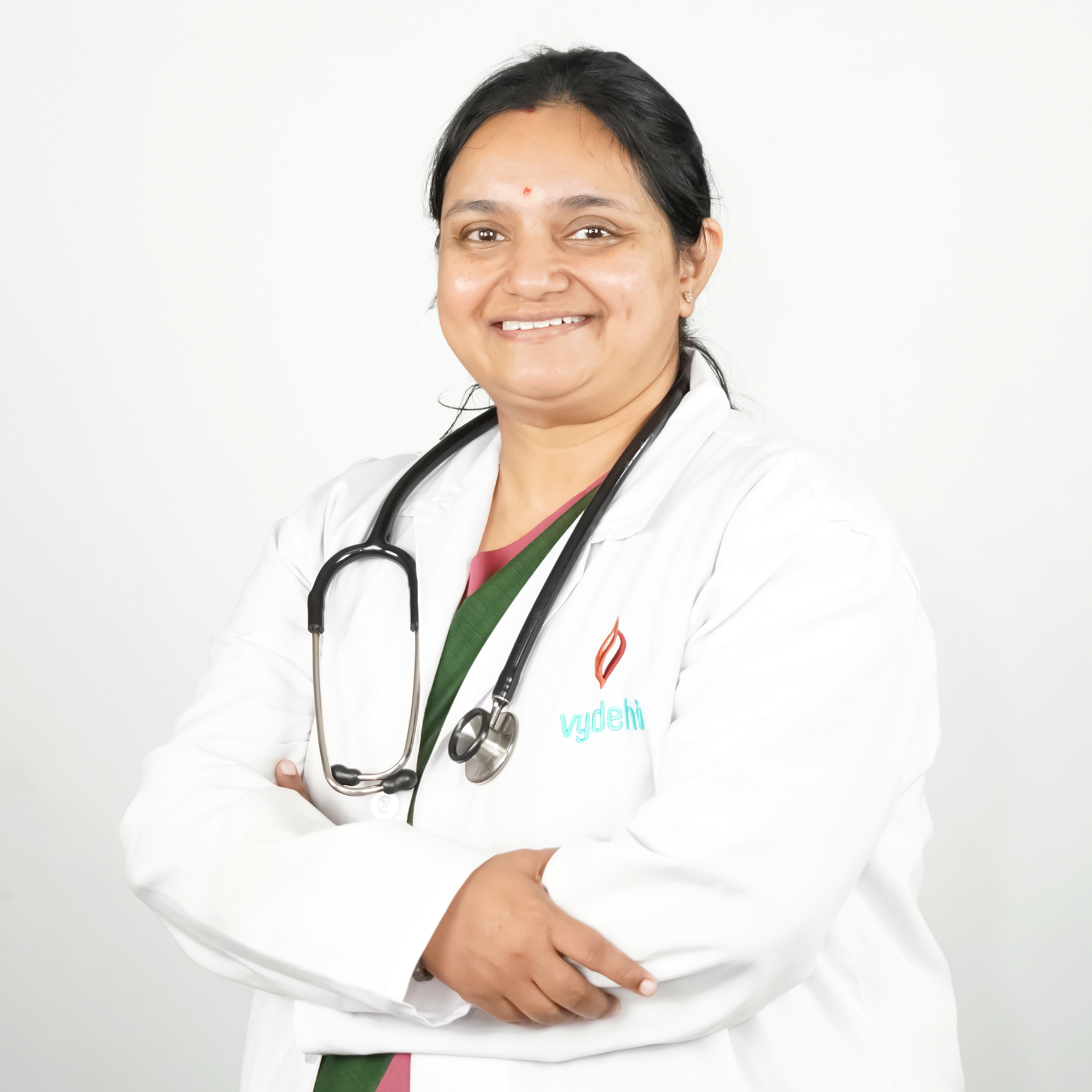
MBBS, MD
Karnataka State Medical
Council Registration Number
84490

MBBS, MD
Karnataka State Medical
Council Registration Number
TSMC/10341
To ease the workflow and provide the perfect treatment for patients, the neurology department has various sub-clinics
Though we treat all neurological disorders, we specialise in treating the following disorders
Different diagnostic tools for the diagnosis and management of patients with disorders of the nervous system are as follows.
ENMG Machine
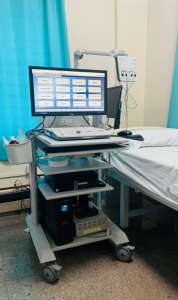
VEP Machine
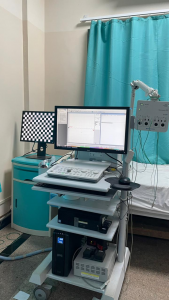
Video EEG Machine
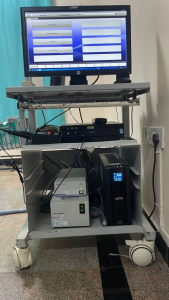
Curriculum – SS:
DM – Neurology
(A)-Basic Sciences Related to Neurology
| Sl. No. | Subjects of Study |
|---|---|
| 1 | Neuroanatomy |
| 2 | Neurophysiology |
| 3 | Molecular Biology |
| 4 | Neurochemistry |
| 5 | Neuropharmacology |
| 6 | Neuropathology |
| 7 | Neuromicrobiology |
| 8 | Neurotoxicology |
| 9 | Neurogenetics and Proteomics |
| 10 | Neuroepidemiology |
(B)-Clinical Neurology including Paediatric Neurology and Neuropsychiatry
| Sl. No. | Subjects of Study |
|---|---|
| 1 | General Evaluation of the Patient |
| 2 | Coma |
| 3 | Seizures and Epilepsy and Syncopes |
| 4 | Headaches and other Cranial Neuralgias |
| 5 | Cerebrovascular Diseases |
| 6 | Dementias |
| 7 | Parkinsonism and Movement Disorders |
| 8 | Ataxic Syndromes |
| 9 | Cranial Neuropathies |
| 10 | CNS Infections |
| 11 | Neuroimmunologic Diseases |
| 12 | Neurogenetic Disorders |
| 13 | Developmental Disorders of Nervous System |
| 14 | Myelopathies |
| 15 | Peripheral Neuropathies |
| 16 | Myopathies and Neuromuscular Junction Disorders |
| 17 | Paediatric Neurology |
| 18 | Cognitive Neurology and Neuropsychiatry |
| 19 | Tropical Neurology |
The clinical examination would be entirely devoted to clinical neurology including paediatrics on the above syllabus and would include one long case of 100 marks and two short cases of 50 marks each, totalling to 200 marks.
(C)-Diagnostic and Interventional Neurology including Neurological Instrumentation
| Sl. No. | Subjects of Study |
|---|---|
| 1 | Diagnostic Neurology |
| 2 | Interventional Neurology and Neuroinstrumentations |
(D)-Recent Advances in Neurology
| Sl. No. | Subjects of Study |
|---|---|
| 1 | Advances in Neuroimaging Techniques |
| 2 | Bionics in Neural Prosthesis and Rehabilitation |
| 3 | Neuroproteomics and Neurogenetics |
| 4 | Stem Cell and Gene Therapy |
| 5 | Neuroepidemiological Studies and Clinical Trials |
The Neurosurgery Department of Vydehi Institute of Medical Sciences & Research Centre started on 01-01-07 and has completed 7000 critical neurosurgical operations.
The branch has highly qualified neurosurgeons who excel in providing the best neurosurgical care in the country using advanced and cutting-edge technology.
Department has advanced neurosurgical OT setup, well equipped Neuro ICU and Neurosurgical wards with neuro intensivists, dedicated and well-trained nursing staff providing personalised care to the patients.
Our Mission
Is to provide world class personalised care to each and every patient using state of the art facility and safe surgical techniques for the better functional outcome and faster recovery of the patient.
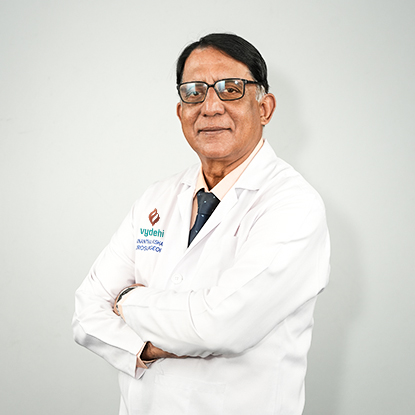
MBBS,M.Ch
Karnataka State Medical
Council Registration Number
16200
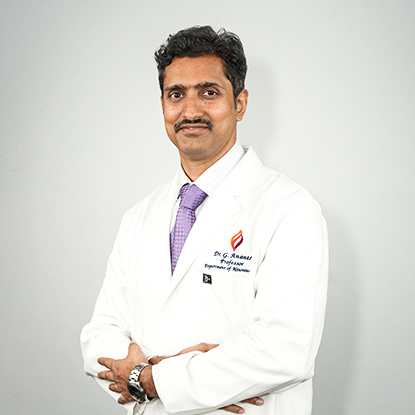
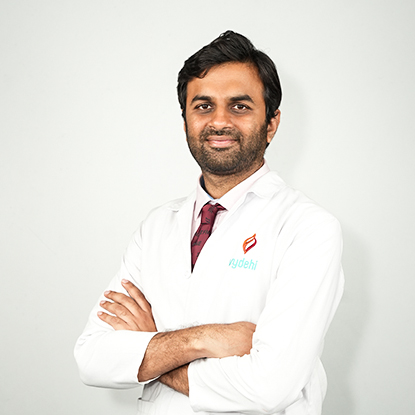
MBBS,MS,M.Ch
Karnataka State Medical
Council Registration Number
100833
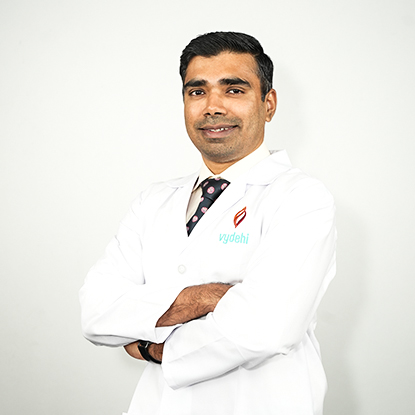
MBBS, DNB
Karnataka State Medical
Council Registration Number
106126

MBBS,MS, M.Ch
Karnataka State Medical
Council Registration Number
104513

MBBS,MS( General Surgery)
Karnataka State Medical
Council Registration Number
113698

MBBS,MS( General Surgery)
Karnataka State Medical
Council Registration Number
120527

MBBS,MS( General Surgery)
Karnataka State Medical
Council Registration Number
02753
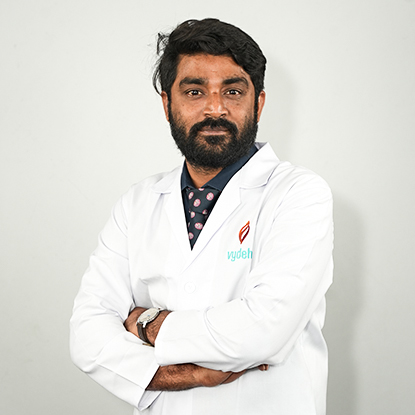
MBBS, MS
Karnataka State Medical
Council Registration Number
102376

MBBS,MD, DM
Karnataka State Medical
Council Registration Number
63461

MBBS,MD, DM
Karnataka State Medical
Council Registration Number
58014
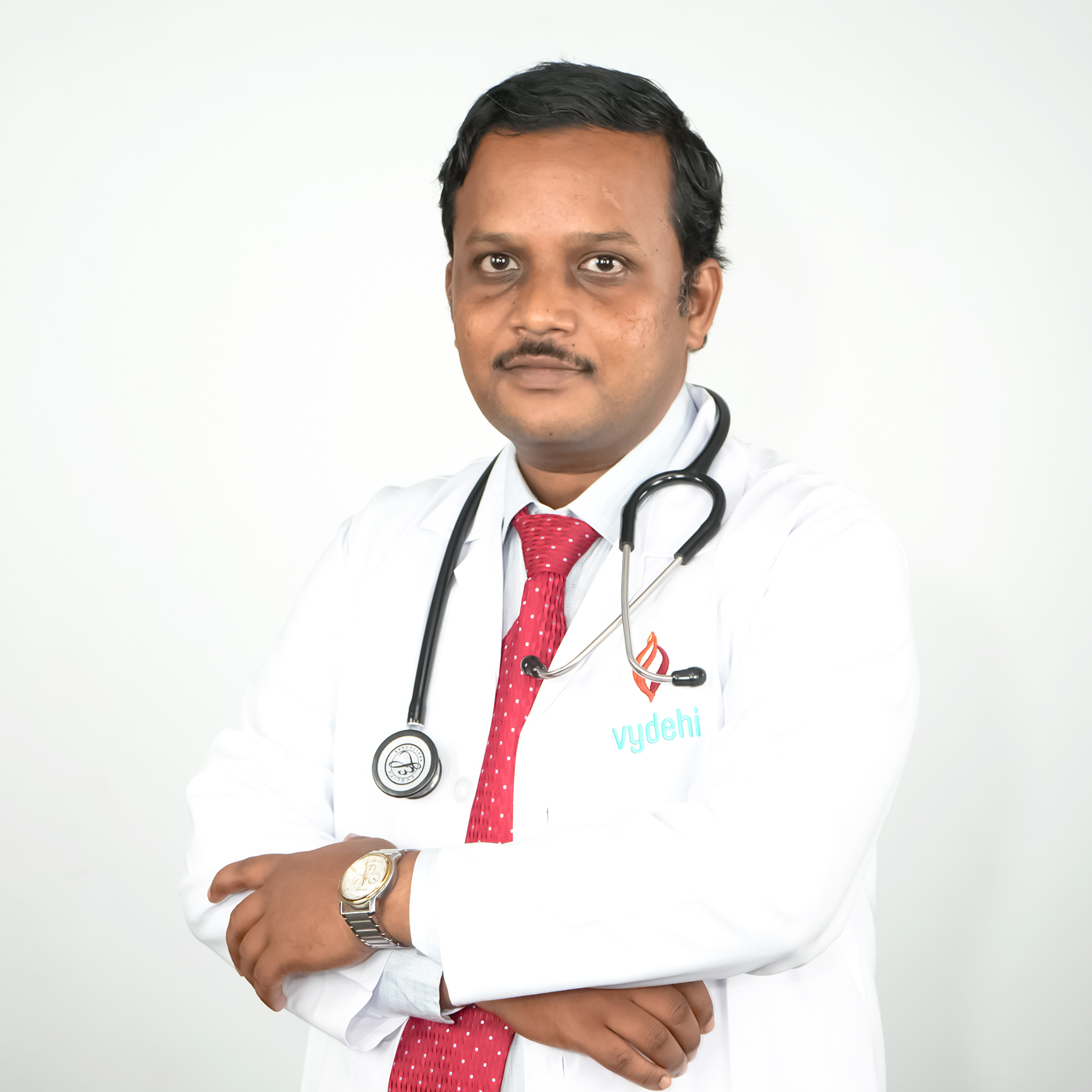
MBBS,MD, DM
Karnataka State Medical
Council Registration Number
87541


MBBS, MD
Karnataka State Medical
Council Registration Number
89296

MBBS,DNB
Karnataka State Medical
Council Registration Number
106908

MBBS, MD
Karnataka State Medical
Council Registration Number
157862

MBBS,MD, DM
Karnataka State Medical
Council Registration Number
95229

MBBS, DNB
Karnataka State Medical
Council Registration Number
156834

MBBS, MD
Karnataka State Medical
Council Registration Number
116247

MBBS,DNB
Karnataka State Medical
Council Registration Number
69815

MBBS, MD
Karnataka State Medical
Council Registration Number
112148

MBBS, MD
Karnataka State Medical
Council Registration Number
63461

MBBS,MD
Karnataka State Medical
Council Registration Number
104140

MBBS,DRT ,DNB
Karnataka State Medical
Council Registration Number
109702
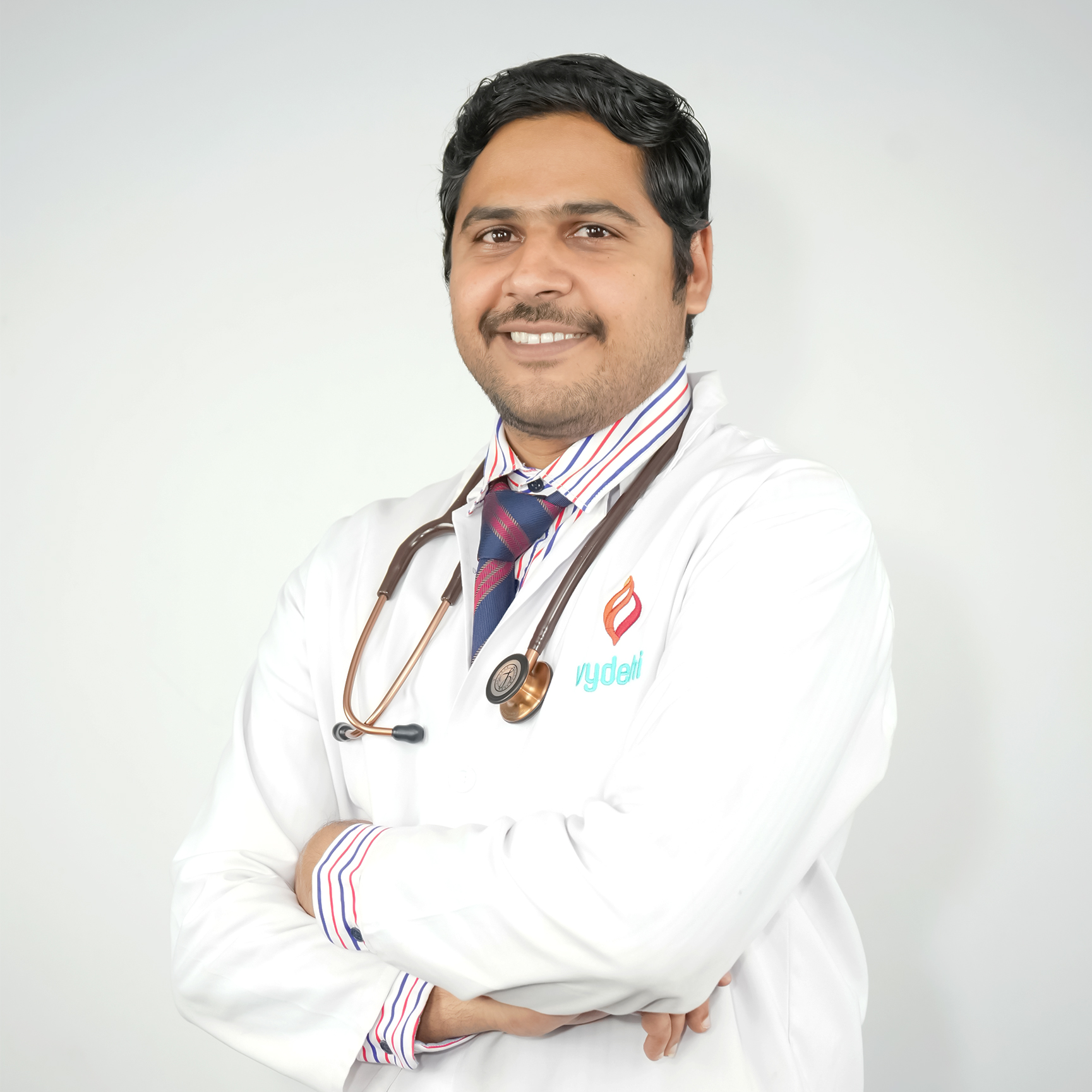
MBBS, MD
Karnataka State Medical
Council Registration Number
954147
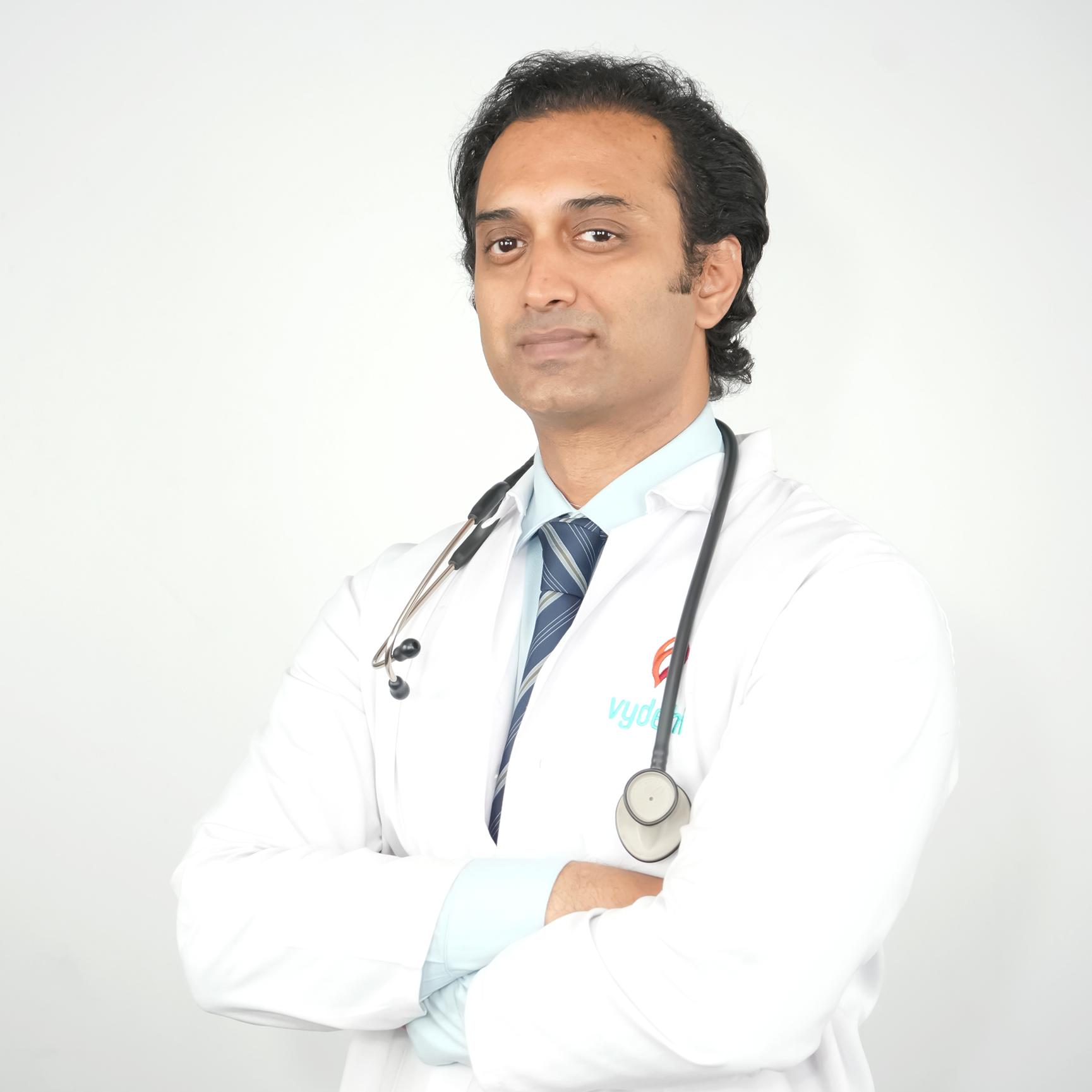
MBBS,MD
Karnataka State Medical
Council Registration Number
1503374

MBBS,MD
Karnataka State Medical
Council Registration Number
125636
The Department of Medical and Pediatric Oncology is the most recent addition to the Vydehi Institute of Oncology and Research center. It was started to provide affordable cancer chemotherapy for all sections of the population.
We understand cancer requires a novel approach towards patients and families. Cancer involves a multidisciplinary tumour board to optimize care and treatment delivery. The specialists, hence, work with empathy when optimizing the treatment for their patients.
The department offers both curative and palliative chemotherapy services for both adult and paediatric patients. The treatment involves diagnosis, staging the diseases, customizing the treatment plan, and treating cancer accordingly. Our specialists plan evidence-based, internationally approved cancer treatments.
Paediatric oncology is a separate specialization since it involves treating children. The cancer treatment is tailor-made for children to help them cope with the stressful effects of the treatment on their lives. To ease their burden, we have play therapies for children where they can express themselves.
The Medical Oncology department plans to establish a comprehensive peripheral blood stem cell transplant facility. This will provide an affordable state-of-the-art treatment for diseases such as lymphomas, multiple myeloma, and certain leukaemia’s, as well as certain paediatric malignancies.
The Department of Radiation Oncology commissioned the state-of-the-art machine, the laser guarded Image guided Radiation therapy (IGRT) and respiratory gating along with IMRT-the intensity modulated radiation therapy, one of its own in the Asia in 2007.This highly specialized department provides services to the treatment of Brain, Head and Neck, Thoracic, Abdominal, Genito-urinary and Extremity tumors. The facility was upgraded to VMAT (Volumetric modulated Arc Therapy- Rapid Arc) in February 2013.
The second linear accelerator machine, Versa HD -Stereotactic Precision Radiotherapy unit (Triple F) was inaugurated on 6th February 2017. Featuring high precision beam shaping and tumor targeting, Versa HD is designed with new capabilities to provide a faster and more accurate treatment for a wider range of cancers. Versa HD offers both conventional and stereotactic treatments. Stereotactic Radiosurgery (SRS) and Stereotactic Body Radiation Therapy (SBRT) are important alternatives to invasive surgery, especially for patients who are unable to undergo surgery and for tumors and abnormalities that are hard to reach and located close to vital organs.
Brachytherapy is commonly used as an effective treatment for cervical, prostate, breast, head & neck and skin cancer and can also be used to treat tumors in many other body sites. Brachytherapy can be used alone or in combination with external radiation therapy. As the radiation sources can be precisely positioned at the tumor treatment site, brachytherapy enables a high dose of radiation to be applied to a small area. We offer MRI based volume optimized intracavitary brachytherapy for cervical cancer using MRI compatible applicators.-Treatment we offer are –ICBT , ISBT , SORBO , ILRT.
Total Skin Electron Radiation Therapy (TSET) in Bangalore at Vydehi, a specialized treatment for lymphoma where the entire skin is treated with electrons. The technique is time consuming to develop and carry out on routine basis. A rigorous quality assurance program needs to be the part of treatment and hence it is being offered at very few selected centers including ours.
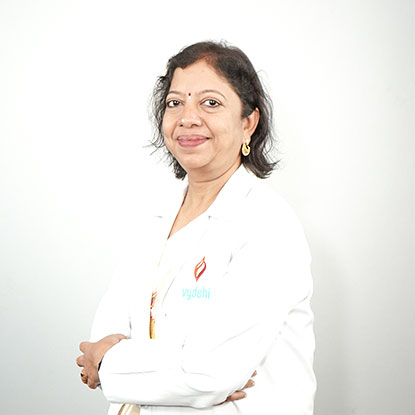
MBBS,MD , DNB
Karnataka State Medical
Council Registration Number
37870
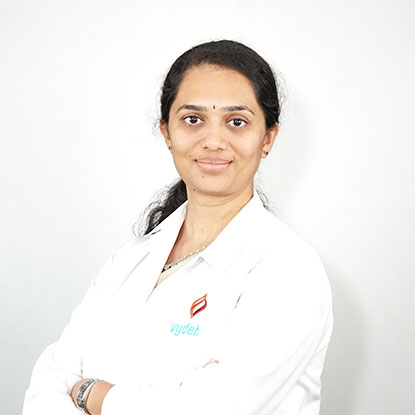
MBBS,MD
Karnataka State Medical
Council Registration Number
80790

Associate Professor
MBBS,MD
Karnataka State Medical
Council Registration Number
23870
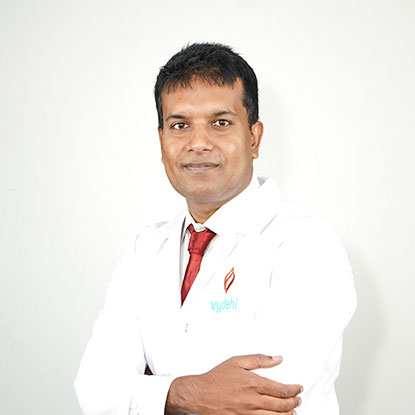
MBBS,MD, DNB
Karnataka State Medical
Council Registration Number
94829
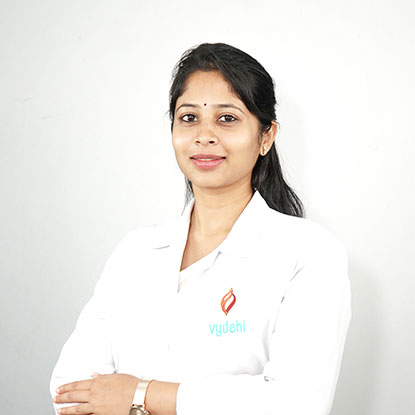
MBBS,MD
Karnataka State Medical
Council Registration Number
119229
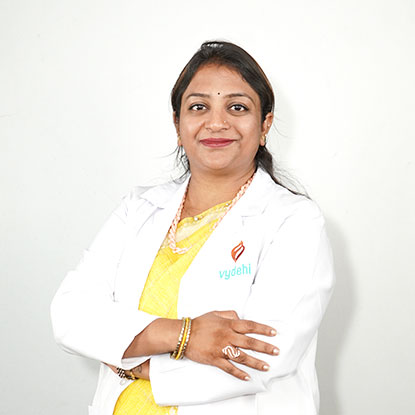
MBBS,MD
Karnataka State Medical
Council Registration Number
120730
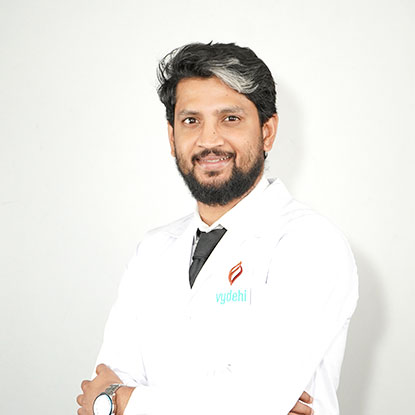
MBBS,MD
Karnataka State Medical
Council Registration Number
121767

MBBS,MD
Karnataka State Medical
Council Registration Number
130587
In 3DCRT, a computed tomography (CT) scan is used to design a radiation therapy treatment. The CT scans help us determine the radiation target volumes and critical structures. The radiation beams from different directions are designed to match the shape of the tumour. This helps to deliver a conformal dose of radiation to the tumour while sparing the normal tissue surrounding the tumour as much as possible. Different cancer types have seen improved outcomes from 3D conformal radiation therapy, including brain cancer, head and neck cancer, liver cancer, lung cancer, and prostate cancer.
IMRT uses advanced computer programs to calculate and deliver radiation to cancer cells. We recommend it for tumours that are located close to critical organs and tissues in the body. Using this method, higher and more effective doses of radiation can be given while limiting damage to the healthy tissues and organs. It also increases the chance for a cure and lessens the likelihood of side effects. The sites where IMRT is preferred are prostate, head and neck, lung, brain, and gastrointestinal. VMAT is another latest technology that has revolutionised radiation therapy. The technology improves dose conformity while significantly shortening treatment times. It delivers treatments two to eight times faster than other dynamic treatments available to date. It also increases precision – creating a winning combination that enables physicians to improve caring standards and treat more patients.
Traditional forms of radiation therapy expose extensive areas of normal tissue to unnecessary radiation. This leads to unacceptable side effects, especially in critical areas like the brain and lungs. Stereotactic radiosurgery (SRS) and Stereotactic Body radiation therapy (SBRT) are advanced and modernised forms of radiation therapy. They help to deliver high dose radiation to a small, focused area. It minimises the effect on nearby organs and reduces treatment-related side effects. SRS and SRBT are a boon, especially for patients who cannot undergo surgery and for tumours and abnormalities located close to vital organs. SRS delivers a great dose of radiation on a single day. SBRT has a fractionated treatment schedule. SRS is used to treat brain tumours, arteriovenous malformations (AVMs), and functional disorders. SBRT is used to treat malignant small-to-medium size tumours in lungs, liver, spine, prostate, etc. One more benefit of these treatments over conventional radiation treatment is that the treatment durations are much shorter. Where two-year success rates for regular treatment vary from 30 to 40 per cent, the success rates for SBRT range from 80 to 90 percent in some tumours.
Our centre was the first to launch laser guarded image-guided radiation therapy in Southeast Asia. Using Image-guided radiation therapy (IGRT) during radiation therapy improves the precision and accuracy of treatment delivery. At Vydehi, we use cone-beam CT (CBCT). We use CBCT with intensity-modulated radiation therapy (IMRT), SRS, or SBRT, an advanced mode of high-precision radiotherapy.
Vydehi was the first to commission respiratory gating in India. The real-time Position Management™ (RPM) system allows clinicians to correlate tumour position in relation to the patient’s respiratory cycle. The system measures the patient’s respiratory pattern and range of motion using an infrared tracking camera and a reflective marker to display them as a waveform. Then the gating thresholds are set when the tumour is in the desired portion of the respiratory cycle. These thresholds determine when the gating system turns the treatment beam on and off. The RPM system facilitates the treatment of the lungs, liver, and pancreas, and helps minimise the dose to the heart in breast treatments.
Total skin electron radiation therapy (TSET): This treatment is delivered to a type of lymphoma. The entire skin is treated with electrons. The technique is time-consuming to develop and carry out routinely. A rigorous quality assurance program needs to be the part of treatment. Hence, it is being offered at very few selected centres.
Radiotherapy, where a sealed radiation source is placed inside or next to the area requiring treatment, is brachytherapy. Oncologists commonly use it as an effective treatment for cervical, prostate, breast, head & neck, and skin cancer. It can also treat tumours in many other body sites. Brachytherapy can be used alone or in combination with external radiation therapy. As we can precisely position the radiation sources at the tumour treatment site, brachytherapy enables a high dose of radiation to be applied to a small area.
Vydehi is one of the very few centres in the country that offers MRI based volume optimised intracavitary brachytherapy for cervical cancer using MRI compatible applicators.
Medical use of x-rays for diagnosis and treatment has proven to be immensely beneficial to the society at large. Vydehi Institute of Medical Sciences & Research Centre, Bangalore is licensed to operate various x-ray and gamma ray radiation generating equipments.
(Use appropriate search filter to locate Vydehi)
(refer page.4)
The institute is governed by the regulations stipulated by Atomic Energy Regulatory Board, Mumbai. The Atomic Energy (Radiation Protection) Rules, 2004 [AE(RP)R-2004], promulgated under the Atomic Energy Act, 1962, provides the legal framework for the safe handling of radiation generating equipment (in this context – X-ray equipment). As per Rule 3 of AE(RP)R-2004 it is mandatory for all the manufacturers/Suppliers/Users of x-ray equipment, to obtain requisite ‘License’ from AERB for carrying out any of the above activities.
The Department of Radiation Oncology has Mega Voltage X-ray Medical Linear Accelerators: 2Nos; Gamma Radioactive source Brachytherapy: 1No and CT simulator: 1No. There are 29 diagnostic x-ray equipments housed in various approved locations in Department of Radiology, Cardiology, Orthopedics, Urology, Neurosurgery and Dental.
The staff working in radiation area are enrolled in Personal Monitoring Services (PMS), as per the regulations stipulated by AERB, Mumbai.
DIRECTOR, VIMS & RC is the licensee for all regulatory affairs. The designated Radiological Safety Officer (RSO) of the institute is Dr. S. Sowmya Narayanan. Institute has Radiation Safety Committee in place with Director as Chairman of the committee, RSO as Secretary of the committee. Members of the committee are all the HoDs using Radiation Generating equipment’s.
The Department of Surgical Oncology conducts major cancer surgeries and related reconstructions. Experienced cancer surgeons, supported by cutting-edge equipment and top-notch infrastructure, have performed a wide range of extensive and complex cancer surgeries.
The Department of Radiation Oncology commissioned the state-of-the-art machine, the laser guarded Image guided Radiation therapy (IGRT) and respiratory gating along with IMRT-the intensity modulated radiation therapy, one of its own in the Asia in 2007.This highly specialized department provides services to the treatment of Brain, Head and Neck, Thoracic, Abdominal, Genito-urinary and Extremity tumors. The facility was upgraded to VMAT (Volumetric modulated Arc Therapy- Rapid Arc) in February 2013.
The second linear accelerator machine, Versa HD -Stereotactic Precision Radiotherapy unit (Triple F) was inaugurated on 6th February 2017. Featuring high precision beam shaping and tumor targeting, Versa HD is designed with new capabilities to provide a faster and more accurate treatment for a wider range of cancers. Versa HD offers both conventional and stereotactic treatments. Stereotactic Radiosurgery (SRS) and Stereotactic Body Radiation Therapy (SBRT) are important alternatives to invasive surgery, especially for patients who are unable to undergo surgery and for tumors and abnormalities that are hard to reach and located close to vital organs.
Brachytherapy is commonly used as an effective treatment for cervical, prostate, breast, head & neck and skin cancer and can also be used to treat tumors in many other body sites. Brachytherapy can be used alone or in combination with external radiation therapy. As the radiation sources can be precisely positioned at the tumor treatment site, brachytherapy enables a high dose of radiation to be applied to a small area. We offer MRI based volume optimized intracavitary brachytherapy for cervical cancer using MRI compatible applicators.-Treatment we offer are –ICBT , ISBT , SORBO , ILRT.
Total Skin Electron Radiation Therapy (TSET) in Bangalore at Vydehi, a specialized treatment for lymphoma where the entire skin is treated with electrons. The technique is time consuming to develop and carry out on routine basis. A rigorous quality assurance program needs to be the part of treatment and hence it is being offered at very few selected centers including ours.

MBBS,MS,& M.Ch
Karnataka State Medical
Council Registration Number
100319

MBBS,MS,& M.Ch
Karnataka State Medical
Council Registration Number
70368

MBBS,MS,& M.Ch
Karnataka State Medical
Council Registration Number
80041

MBBS,MS,& M.Ch
Karnataka State Medical
Council Registration Number
94000

MBBS,MS,& M.Ch
Karnataka State Medical
Council Registration Number
81459

MBBS,MS
Karnataka State Medical
Council Registration Number
117240

MBBS,MS
Karnataka State Medical
Council Registration Number
83867

MBBS,MS
Karnataka State Medical
Council Registration Number
128651

MBBS,MS
Karnataka State Medical
Council Registration Number
170602

MBBS,MS,& M.Ch
Karnataka State Medical
Council Registration Number
118866

MBBS,MS
Karnataka State Medical
Council Registration Number
2016061296

MBBS,MS
Karnataka State Medical
Council Registration Number
100201

MBBS,DNB
Karnataka State Medical
Council Registration Number
54891

MBBS,MS
Karnataka State Medical
Council Registration Number
2009030948

MBBS,MS
Karnataka State Medical
Council Registration Number
59122

MBBS,MS
Karnataka State Medical
Council Registration Number
94200

MBBS,MS
Karnataka State Medical
Council Registration Number
1125

MBBS,MS
Karnataka State Medical
Council Registration Number
124152

MBBS,MS
Karnataka State Medical
Council Registration Number
113599

MBBS,MS
Karnataka State Medical
Council Registration Number
170442
| No. | Name of the Clinic | Day | Timings |
|---|---|---|---|
| 1. | Head and Neck Clinic | Tuesday | 11 AM to 1 PM |
| 2. | Breast ClinSlic | Wednesday | 11 AM to 1 PM |
| 3. | Gynec Oncology Clinic | Thursday | 11 AM to 1 PM |
The Surgical Oncology Department is dedicated to providing advanced, multidisciplinary cancer care. Equipped with state-of-the-art technology and a team of highly skilled surgeons, our department offers a comprehensive range of services designed to treat complex malignancies with precision and care.
Our services extend to the surgical management of a wide range of cancers, including but not limited to gastrointestinal, head and neck, gynecological, thoracic, and soft tissue tumors. Each patient receives a personalized treatment plan developed in collaboration with our multidisciplinary team, ensuring a holistic approach to cancer care.
Our department emphasizes patient-centered care, ensuring that each individual receives tailored support throughout their treatment journey. From preoperative counseling to postoperative rehabilitation, our team is committed to providing compassionate, comprehensive care.
By integrating cutting-edge technology with a patient-focused approach, the Surgical Oncology Department is at the forefront of cancer treatment, offering hope and improved outcomes for patients battling cancer.
We utilize the latest in robotic-assisted surgical systems (Da Vinci X), allowing our surgeons to perform intricate procedures with unparalleled accuracy. Robotic surgery offers benefits such as smaller incisions, reduced blood loss, shorter hospital stays, and faster recovery times, making it a preferred option for many oncologic surgeries.
Our department is a leader in minimally invasive laparoscopic surgery, providing patients with a less invasive alternative to traditional open surgery. Using advanced 3D laparoscopy and fluorescence-guided techniques like Indocyanine Green (ICG), we enhance the safety and efficacy of tumor resections, lymph node dissections, and other oncologic procedures.
A 3D laparoscopy unit enhances minimally invasive surgery by providing surgeons with a stereoscopic view, offering greater depth perception and spatial orientation than traditional 2D systems. This technology is particularly valuable in surgical oncology, where precise dissection and identification of anatomical structures are critical.
Indocyanine Green (ICG) is a fluorescent dye used in conjunction with 3D laparoscopy to improve visualization during surgery. When injected, ICG binds to plasma proteins and emits fluorescence under near-infrared light, allowing for the real-time identification of blood vessels, lymph nodes, and tumor margins. This combination enhances the accuracy of tumor resections, lymph node mapping, and identification of critical structures, leading to better surgical outcomes in oncology patients.
We offer HIPEC as a specialized treatment for patients with peritoneal surface and advanced ovarian malignancies. This innovative procedure involves the direct application of heated chemotherapy agents into the abdominal cavity during surgery, targeting residual cancer cells more effectively while minimizing systemic toxicity.
Our Surgical Oncology Department provides intraoperative frozen section analysis, a critical service that allows for real-time evaluation of tissue samples during surgery. This technique involves rapidly freezing and slicing a specimen, which is then examined under a microscope to determine if cancerous cells are present. Frozen section analysis is particularly valuable for ensuring clear surgical margins, helping surgeons make immediate decisions about the extent of tissue removal needed. By offering this service, we enhance the precision of oncologic surgeries, reduce the need for additional procedures, and improve overall patient outcomes by ensuring that the most effective surgical approach is taken in real-time.
Our Surgical Oncology Department is highly proficient in performing sentinel lymph node biopsies, a minimally invasive procedure crucial for accurate cancer staging, particularly in breast cancer and melanoma. This technique involves identifying, removing, and examining the first lymph node(s) to which cancer cells are likely to spread from the primary tumor. By focusing on these sentinel nodes, we can determine the presence or absence of metastasis with precision, minimizing the need for more extensive lymph node dissections. Sentinel lymph node biopsy helps reduce complications such as lymphedema, while providing essential information to guide further treatment decisions, making it a cornerstone of personalized cancer care in our department.
Our Surgical Oncology Department is renowned for its expertise in limb salvage surgeries, a critical option for patients with bone and soft tissue tumors. These complex procedures aim to remove the tumor while preserving the limb’s function and appearance, offering an alternative to amputation. Our surgeons collaborate with orthopedic specialists to design individualized surgical plans, often incorporating advanced techniques like custom prosthetics and reconstructive surgery to optimize outcomes. Limb salvage not only improves the patient’s quality of life but also enhances long-term mobility and functionality.
We run one of the largest limb salvage surgery programs in Karnataka and the country. Our ties with Mishra Dhatu Nigam Limited, a Ministry of Defence organization, allow us to procure Titanium Prostheses for extremities.
Our Surgical Oncology Department offers partial nephrectomy, a kidney-sparing procedure ideal for patients with localized kidney tumors. This surgery involves the removal of only the cancerous part of the kidney, preserving as much healthy tissue as possible. By maintaining kidney function, partial nephrectomy reduces the risk of chronic kidney disease and the need for dialysis, providing a significant benefit over radical nephrectomy, which removes the entire kidney. Utilizing advanced techniques, including robotic and laparoscopic approaches, our surgeons ensure precise tumor excision with minimal impact on the surrounding tissues, leading to quicker recovery and excellent long-term outcomes for patients.
Our Surgical Oncology Department is skilled in performing partial laryngectomy, a voice-preserving surgery for patients with early to moderately advanced laryngeal cancer. This procedure involves removing only the cancerous portion of the larynx (voice box), while retaining as much of the normal laryngeal structure as possible. Partial laryngectomy allows patients to maintain their ability to speak and swallow, significantly improving their quality of life compared to a total laryngectomy. Our surgeons utilize meticulous techniques to ensure complete tumor removal while preserving essential functions, offering a balanced approach to cancer treatment that prioritizes both oncologic control and functional outcomes.
Our Surgical Oncology Department excels in Oncoplastic breast surgery, an innovative approach that combines cancer removal with plastic surgery techniques to achieve optimal oncologic and cosmetic outcomes. This procedure allows for the removal of breast tumors while simultaneously reconstructing the breast to maintain its natural appearance and symmetry. Oncoplastic surgery is particularly beneficial for patients with larger tumors or those requiring significant tissue removals, as it minimizes deformities and enhances aesthetic results. Our team of skilled surgeons works closely with each patient to tailor the surgery to their individual needs, ensuring both effective cancer treatment and a preserved quality of life.
Our Surgical Oncology Department specializes in microvascular reconstruction, a cutting-edge technique used to restore function and appearance after the removal of head and neck tumors. These procedures involve transplanting tissue, along with its blood supply, from one part of the body to another to reconstruct complex defects. This approach is essential for preserving vital functions such as speech, swallowing, and facial aesthetics. Our team of expert surgeons employs advanced microsurgical techniques to ensure precise blood vessel connections, leading to better healing, reduced complications, and improved quality of life for patients undergoing head and neck cancer treatment.
Our Surgical Oncology Department offers comprehensive whole breast reconstruction services, providing patients with options to restore the breast’s appearance following mastectomy. This procedure can be performed using autologous tissue (from the patient’s own body), implants, or a combination of both, depending on the patient’s preferences and medical needs. Whole breast reconstruction is an integral part of the healing process, helping patients regains a sense of normalcy and confidence after breast cancer surgery. Our team of expert surgeons collaborates closely with each patient to create a personalized reconstruction plan, focusing on achieving natural-looking results that enhance the overall quality of life.
The Department of Radiation Oncology commissioned the state-of-the-art machine, the laser guarded Image guided Radiation therapy (IGRT) and respiratory gating along with IMRT-the intensity modulated radiation therapy, one of its own in the Asia in 2007.This highly specialized department provides services to the treatment of Brain, Head and Neck, Thoracic, Abdominal, Genito-urinary and Extremity tumors. The facility was upgraded to VMAT (Volumetric modulated Arc Therapy- Rapid Arc) in February 2013.
The second linear accelerator machine, Versa HD -Stereotactic Precision Radiotherapy unit (Triple F) was inaugurated on 6th February 2017. Featuring high precision beam shaping and tumor targeting, Versa HD is designed with new capabilities to provide a faster and more accurate treatment for a wider range of cancers. Versa HD offers both conventional and stereotactic treatments. Stereotactic Radiosurgery (SRS) and Stereotactic Body Radiation Therapy (SBRT) are important alternatives to invasive surgery, especially for patients who are unable to undergo surgery and for tumors and abnormalities that are hard to reach and located close to vital organs.
Brachytherapy is commonly used as an effective treatment for cervical, prostate, breast, head & neck and skin cancer and can also be used to treat tumors in many other body sites. Brachytherapy can be used alone or in combination with external radiation therapy. As the radiation sources can be precisely positioned at the tumor treatment site, brachytherapy enables a high dose of radiation to be applied to a small area. We offer MRI based volume optimized intracavitary brachytherapy for cervical cancer using MRI compatible applicators.-Treatment we offer are –ICBT , ISBT , SORBO , ILRT.
Total Skin Electron Radiation Therapy (TSET) in Bangalore at Vydehi, a specialized treatment for lymphoma where the entire skin is treated with electrons. The technique is time consuming to develop and carry out on routine basis. A rigorous quality assurance program needs to be the part of treatment and hence it is being offered at very few selected centers including ours.
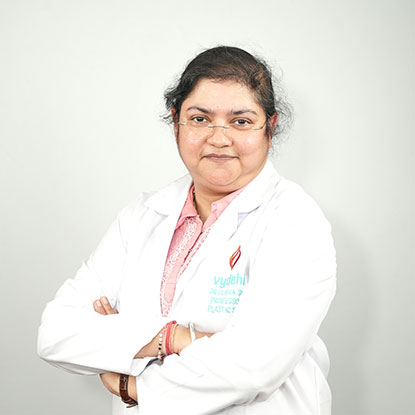
MBBS,MS,M.Ch
Karnataka State Medical
Council Registration Number
107894
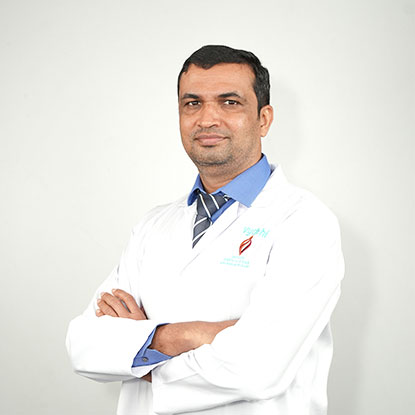
Professor
MBBS,MS,M.Ch
Karnataka State Medical
Council Registration Number
63517
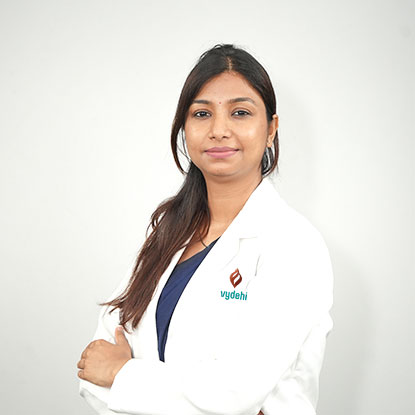
MBBS,MS,M.Ch , DNB
Karnataka State Medical
Council Registration Number
91447
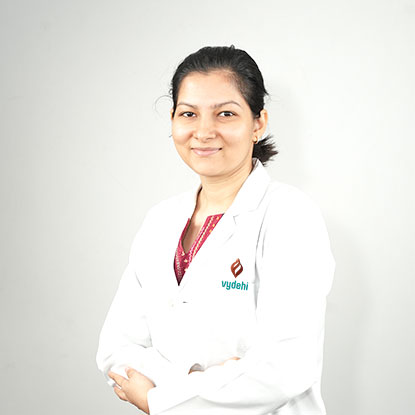
MBBS,MS
Karnataka State Medical
Council Registration Number
67163
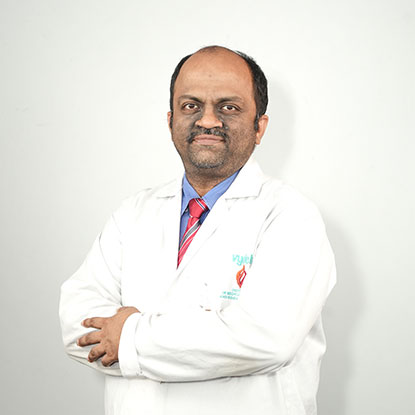
MBBS,MS
Karnataka State Medical
Council Registration Number
98623
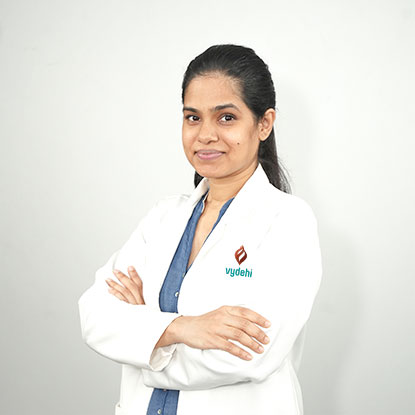
MBBS,MS
Karnataka State Medical
Council Registration Number
110042
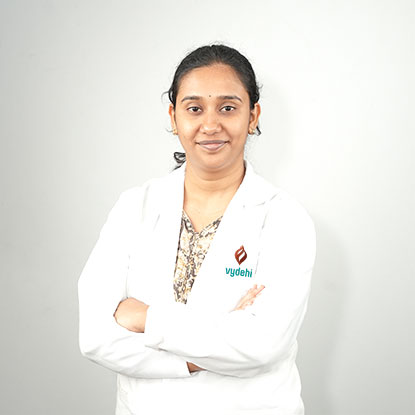
MBBS,MS
Karnataka State Medical
Council Registration Number
109589
Reconstructive Surgery is among the basics of plastic surgical training. It deals with all kinds of reconstructive work following Burns, Trauma, Cancer, and other related deformities of the body.
Cosmetic Surgery is among the most demanding sub-specialty today, both for technical skills and prosperity of the surgeon. It mainly deals with beautification, age camouflaging, and refinement of the existing features in the body. Besides, it also deals with some of the congenital problems related to the ear, nose, etc.
A bulk of work in this field includes:
Again, this is also the most demanding area of Plastic Surgery. Micro-vascular Surgery requires dedication and patience to perform long hours of operations. It deals with
This branch deals with acute burns because of thermal, electrical, chemical and other causes. It involves managing patients from the critical stage (updated intensive burn care unit) to the complete recovery. Post-burn sequelae management involves a series of reconstructive procedures to obtain acceptable, functional, and aesthetic results. It also takes into consideration the rehabilitation of affected individuals.
A major sub-specialty of Plastic Surgery, Hand Surgery, deals with all hand-related problems. It is one of the fascinating fields in Plastic Surgery. It deals with:
It deals with the management of cases where patients have defects from birth. At Vydehi, we perform surgeries of all kinds, a few of them are:
Besides these, it also deals with other anomalies of the chest, abdominal wall, and other extremities.
Craniofacial and Maxillofacial Surgery is an eminent subspecialty. It deals with the management of:
Plastic Surgery is the most demanding field in a higher surgical specialty, both from a technical and a planning point of view. It can improve the social, economic, and functional image of a person or an individual.
Urology deals with the study and treatment of urinary tract disorders. The department of Urology at the Vydehi Hospital offers comprehensive urological services under the able guidance of its experienced professionals. Urology department at Vydehi is one of the leading Urology departments in Bangalore for both Urology clinical services and education. It is also one of the busiest clinical departments in the campus. The department currently has 5 full time dedicated faculty and 3 residents providing round the clock Urology care to the patients both in the Out Patient Clinic and inpatient areas. Its highly qualified doctors and support staff have the backing of state-of-the-art diagnostic facilities to help them deliver immediate and long-term treatments.
The urology department of VIMS&RC excels in treating urinary difficulties and other disorders, including:
Our aim is to offer you the highest standards of cost-effective urological care. The department reviews an average of 12000 outpatients a year and nearly 2500 inpatients, besides performing 2500 urological operative procedures. The specialists regularly perform endoscopic, laser, robotic and advanced laparoscopic procedures and reconstructive urological procedures. We are also adept in renal transplantation surgeries.

MBBS,MS,M.Ch
Karnataka State Medical
Council Registration Number
82235

MBBS,MS,M.Ch
Karnataka State Medical
Council Registration Number
63283

MBBS,MS,M.Ch
Karnataka State Medical
Council Registration Number
95147

MBBS,MS,M.Ch
Karnataka State Medical
Council Registration Number
TMN20110000786KTK

MBBS,MS, M.Ch
Karnataka State Medical
Council Registration Number
111944

MBBS,MS
Karnataka State Medical
Council Registration Number
124428

MBBS,MS
Karnataka State Medical
Council Registration Number
114679

MBBS,MS
Karnataka State Medical
Council Registration Number
128090
The Urology Department of VIMS & RC provides the following services at affordable cost to all sections of the society. We offer one of the most comprehensive treatment and care plans for many urological disorders.
Five consultants are managing the OPD from 9am to 4pm on all days except Sunday. Minor surgical procedures like Dilatations, Biopsies, Stent Removals, Per Cutaneous Nephrostomies, and Stapler Circumcision and Cystoscopies are done in the OPD. The department has an Uroflowmetry Room, Urodynamic Study Room, Eswl Room And Minor Operation Theatre attached to OPD.
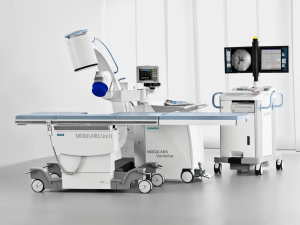
Two Fully equipped LAMINAR FLOW Operation theatres support the department. It’s managed by a team of anesthetists who are available round the clock. The theatre has a C-Arm, laparoscopy tower with all required endoscopic, laparoscopic and LASER equipment AND DAVINCI X ROBOTIC SYSTEM FOR ROBOTIC PROCEDURES. Dedicated nursing and paramedical staff ably assist the operative team.
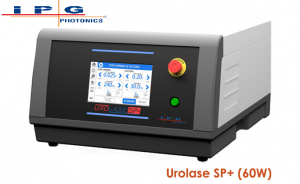
Laser Machine

General wards, twin sharing wards (SILVER WARD), single private ROOMS (GOLDEN WARD) and deluxe ROOMS (DIAMOND WARD), AND SUITE ROOMS (DWC) ARE available
There is a dedicated post-operative ward for taking care of operative cases.
The hospital ICU managed by dedicated ICU team, will take care of urology patients if ICU admission is required.
well equipped laboratory that works round the clock supported by pathology, microbiology and Haematology and biochemistry teams.
Digital X-Ray, CT scan, MRI scan, PET CT SCAN, NUCLEAR SCANS, Ultrasonography, IVP, RGU and MCU facilities are available round the clock.
Emergency department is managed by dedicated Emergency medicine team which functions round the clock. They will coordinate with the consultants in providing emergency services


 Emergency Number
Emergency Number